In 2016, inspired by the #OscarsSoWhite conversation and other conversations about racial diversity at the Oscars that started around it, I volunteered to write a post listing all the white actors who had been nominated for Oscars for playing people of color. As I did the research for that post, however, a few other things came up that I wanted to look into, and thus this project quickly evolved into something more.
Firstly, I wanted to add milestones to the timeline about when actual people of color were nominated for Oscars, but what I was learning in order to pinpoint these milestones was so interesting that I started looking further. Before long, I’d created an extensive spreadsheet situation holding a wealth of data I’ve only just begun to analyze.
Secondly, throughout my research I grew increasingly interested in other ways white people have acquired Oscars on the backs of people of color or otherwise refused to cede the floor, like through white savior narratives. I noticed alarming patterns like the Academy’s habit of nominating films with majority-Asian casts for Best Picture and not a single acting nomination.
Now, it has become an annual ritual to assess and update this post after each subsequent Oscars ceremony. Let’s get into it.
This post was most recently updated in March 2024.
East, Southeast and South Asian Actors
2023 was a huge year for Asian actors — Everything Everywhere All At Once earned more acting nominations and wins than any previous film with a majority-Asian cast and became the first to win multiple Acting Awards as well as Best Picture. Also, Hong Chau was nominated for her role in The Whale. Previously, biggest gains in this category happened in 2021, when British-Pakistani actor Riz Ahmed was nominated for Best Actor for Sound of Metal. Youn Yuh-jung and Steven Yeun were both nominated for Minari, and Youn won, making her the first Korean actor to win an Academy Award. In the 2021 ceremony,
2024 saw an unfortunate return to one the Academy’s most racially problematic friends: films with majority-Asian casts that were nominated for Best Picture failed to garner any acting nominations, which happened this year with Past Lives, after happening in 2020 when Parasite was nominated for Best Picture, Best Director, Best Original Screenplay, Best International Feature Film, Best Production Design and Best Editing — without a single solitary nomination for Acting. There have been major snubs in recent years, includingThe Handmaiden, Crazy Rich Asians,The Farewell, Coming Home, Burning, The Grandmaster, Court, The Big Sick, Downsizing, A Taxi Driver and Decision to Leave.
Patterns throughout history: many of the actors are white-passing and/or play white roles, a lot of Ben Kingsley, and a lot of movies about war. I also found a troubling trend in Best Picture nominees:

Latinx and Latin American Actors
There were no stand-out patterns amongst performances that garnered nominations for Latinx actors, aside from the fact that a lot of them were playing white/anglo characters. Four nominations come from Alejandro González Iñárritu movies. The only updates required for this infographic since 2016 were to account for two actresses nominated for Roma, Yalitza Aparicio and Marina de Tavira; and for Ariana DeBose’s 2022 win for West Side Story (which made her the first openly queer woman of color to be nominated for an Academy Award for acting.) Aparicio, who is of Mixtec and Trique descent, is also the first Indigenous American woman to receive a nomination for Best Actress. Snubs in recent years include actors in Knives Out, Hustlers and Beatriz at Dinner.

Black Actors
Quite a few Black actors and actresses have been nominated for Academy Awards, but it’s still pretty paltry, especially when so many films featuring black actors are snubbed year after year. As discussed in What Does The Academy Value in a Black Performance?, there are certain themes that emerge when looking at what the films earning nominations were about: celebrities (e.g., Ray Charles, Muhammad Ali, Tina Turner, Billie Holiday, Ma Rainey), criminal behavior and incarceration, slavery, black people working for or taking care of white people and narratives centered on white saviors and/or white sidekicks. Also, a lot of Martin Ritt and Stanley Kramer movies.
This was the area that required the most updates from 2016 to 2024 — 25 Black actors were nominated for Academy Awards in the last six years, and several won. Films written and directed by Black people like Mudbound, Judas and the Black Messiah, Get Out, Black Panther, Moonlight, If Beale Street Could Talk, Ma Rainey’s Black Bottom, One Night in Miami and BlacKkKlansman received nominations in various categories. Still, major snubs abounded in the 2020s: Lupita Nyong’o for Us, Eddie Murphy for Dolemite is My Name, Jennifer Hudson for Respect, Viola Davis for The Woman King and Danielle Deadwyler for Till, among others. In 2023, Jordan Peele’s Nope was shut out altogether and at the ceremony, Angela Bassett was amongst three women of color passed over for the Supporting Actress win. In 2024, Da’Vine Joy Randolph had a big win as Supporting Actress for The Holdovers, but four other Black actors lost their nominations.
The Lead Actress category continues to offer Black women nominations but never a win.

North African and Middle Eastern Actors
North African and Middle Eastern Acting Nominees are few and far between. There are four who have been nominated (included in the timeline below): Omar Sharif in 1962 and Shohreh Aghdashloo in 2003. In 2019, Rami Malek became the first actor of Egyptian heritage to win an Academy Award for Best Actor for his role in Bohemian Rhapsody. The lack of representation in this area is especially egregious considering the accolades heaped upon multiple all-white editions of Cleopatra and the fact that a lot of Academy Award winning films are set in the Middle East. (Here’s a great article about typecasting of Muslim-American actors specifically: You May Know Me From Such Roles as Terrorist #4.)
Native American / Indigenous / First Nation Actors
Only five Native American / Indigenous / First Nation actors have been nominated for Academy Awards, which is particularly shameful when you consider Hollywood’s rich legacy of redface and the number of films about Native Americans that have garnered awards for white people, such as Dances With Wolves, The Lone Ranger, The Last of the Mohicans, Broken Arrow, Pocahontas, The Revenant and Stagecoach. In 2019, Yalitza Aparicio became the first Indigenous and second Mexican woman nominated for a Best Actress award.
Actress Keisha Castle-Hughes is the only Pacific Islander nominated for an Academy Award I could find — for the really kickass movie Whale Rider.
Some sources count Russell Crowe, nominated for Gladiator, because he has a Māori great grandmother.
In 2024, Lily Gladstone became the second Indigenous woman and first queer Indigenous woman nominated for an Lead Actress Oscar when she was nominated for Killers of the Flower Moon.
Racism at the Academy Awards: A Timeline
Now, let’s get into the timeline, which I hope will give a good overview of how the Academy has handled race and how white people are often more celebrated for stories about people of color than the people of color themselves. Feel free to add more conversation in the comments!
1928
White actor Warner Baxter wins Best Actor for his portrayal of Mexican character The Cisco Kid in In Old Arizona.
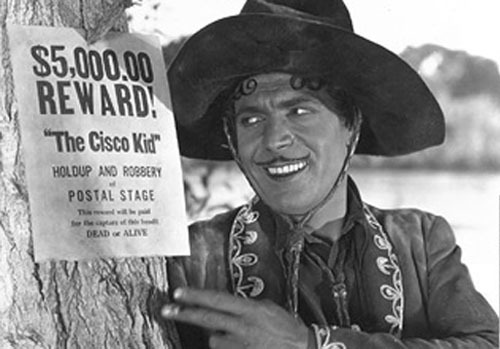
1930
White actor George Arliss wins Best Actor for playing South Asian character The Raja in The Green Goddess.
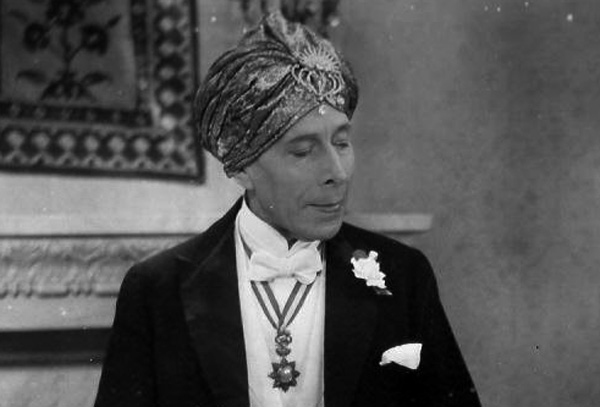
1932
Shanghai Express, nominated for Best Picture, features Marlene Dietrich as a courtesan named Shanghai Lily and Swedish actor Warner Oland playing an ostensibly East Asian character Henry Chang. Oland, who was Swedish, had great success playing Asian characters throughout his career, including 16 films in which he played Chinese detective “Charlie Chan.” Chinese-American actress Anna Mae Wong played Hui Fei, one of her few leading roles. Despite taking place in China, very few Chinese actors appeared in the film.
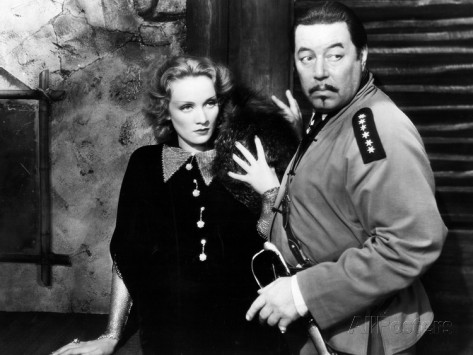
1934
Cleopatra, an Egyptian queen of North African and Greek heritage, is pretty much always played by white actresses, like Claudette Colbert did in this version. It was nominated for Best Picture.
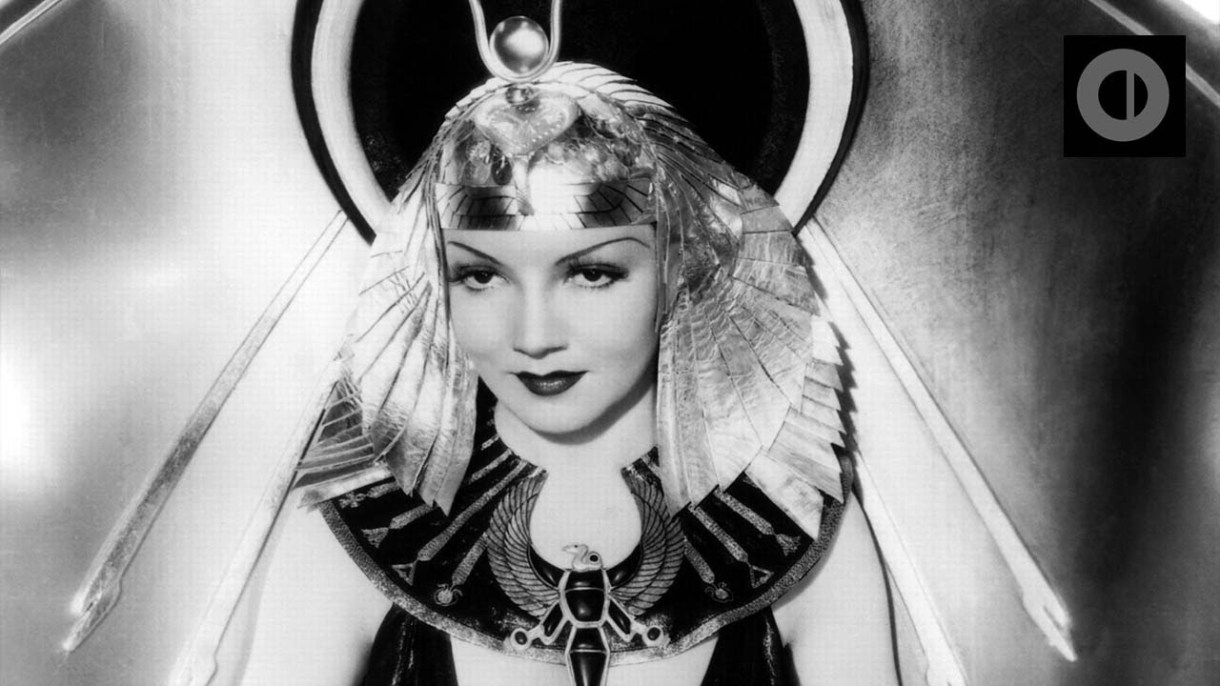
Also in 1934, The Hays Code, which strongly recommended against onscreen depictions of relationships between white people and black people, went into effect and lasted into the ’50s.
1935
First Asian-American Nominated For an Academy Award for Acting: Merle Oberon becomes the first Asian actor nominated for an Academy Award for her role as Kitty Vane in The Dark Angel. She is also the first Asian actress nominated for Best Lead Actress. However, Oberon claimed to be white throughout her career and passed as white. Merle was born in Bombay and raised by a part-Sinhalese and possibly part-Maori mother. The intricacies of Merle’s background and family situation are reported differently by every source I have consulted, and much of it remains muddled, although all agree that Merle’s actual mother was the woman she believed to be her half-sister, who had birthed Merle following a sexual assault at the age of 12.
Oberon didn’t reveal her Indian heritage until 1978, a year before her death.
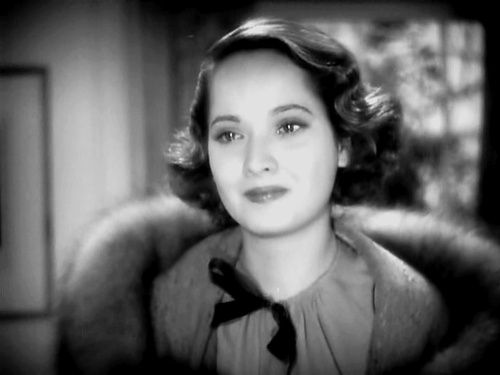
1936
Russian-born Armenian actor Akim Tamiroff is nominated for Best Supporting Actor for playing Chinese warlord General Yang in The General Died at Dawn. According to Wikipedia, “makeup artist Charles Gemora applied sponge rubber eyelids for one of the actors.”
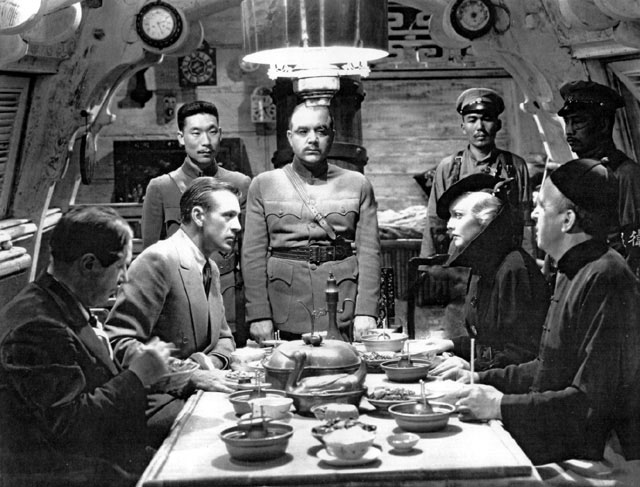
1937
White actress Louise Rainer wins Best Actress for playing Chinese servant O-Lan in the film adaptation of Pearl S. Buck’s novel The Good Earth. The Good Earth was also nominated for Best Picture. Every main character in the cast was played by a white actor in heavy prosthetics and makeup.
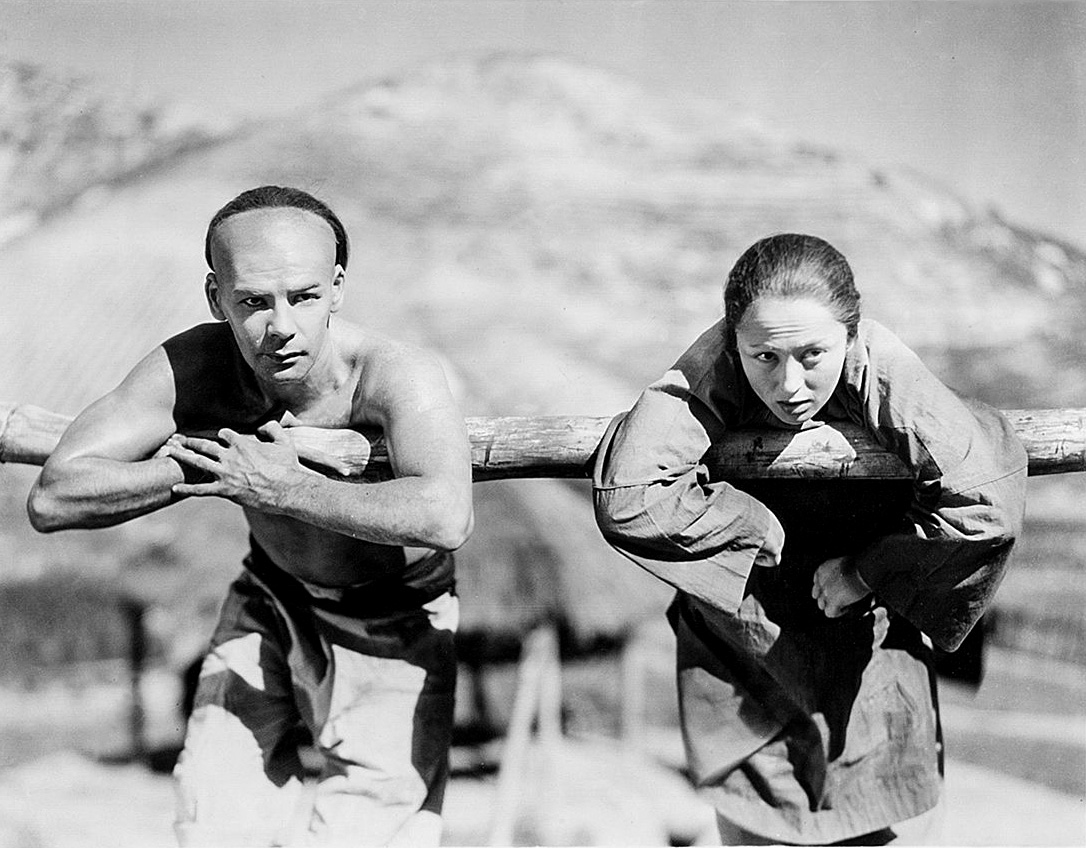
White actor H.B Warner is nominated for Best Supporting Actor for playing Chinese character Chang in Lost Horizon.

1939
First Black Actor and First Black Woman to be Nominated for or to Win an Academy Award for Acting, First Person of Color to Win An Academy Award For Acting: Black Actress Hattie McDaniel becomes the first black actor to be nominated for and to win an acting Academy Award for playing Mammy, the house slave of Scarlett O’Hara’s family, in Gone With The Wind. She and her escort were made to sit at a segregated table for two in the back at the Ambassador Hotel during the Oscars ceremony and she was prohibited from entering the after-party attended by her cast mates.
It would be 50 years before another Black woman would win an Academy Award for Acting.
1943
Armenian actor Akim Tamiroff and Greek actress Katina Paxinou both get Supporting Actor/Actress nominations for playing Pablo and Pilar in For Whom The Bell Tolls. The characters were of Spanish descent and therefore not necessarily dark-skinned, but the filmmakers went all-out with the bronzer regardless.
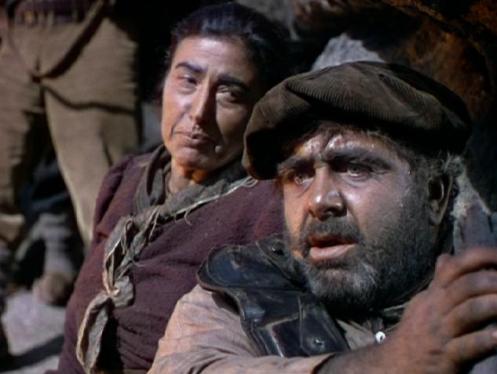
1944
White actress Aline MacMahon gets a Best Supporting Actress Nomination for playing Chinese character “Ling Tan’s Wife” in Dragon Seed. Her daughter was played by Katherine Hepburn in one of the most egregious examples of yellowface ever.
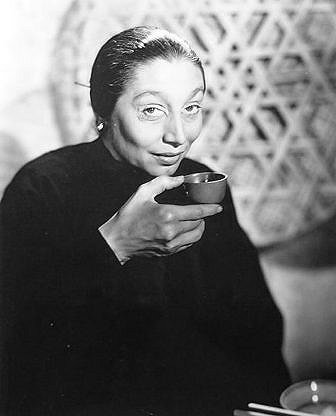
Aline MacMahon in “Dragon Seed”
1946
White actress Jennifer Jones is a Best Actress Nominee for playing Mestiza character Pearl Chavez in Duel in the Sun.
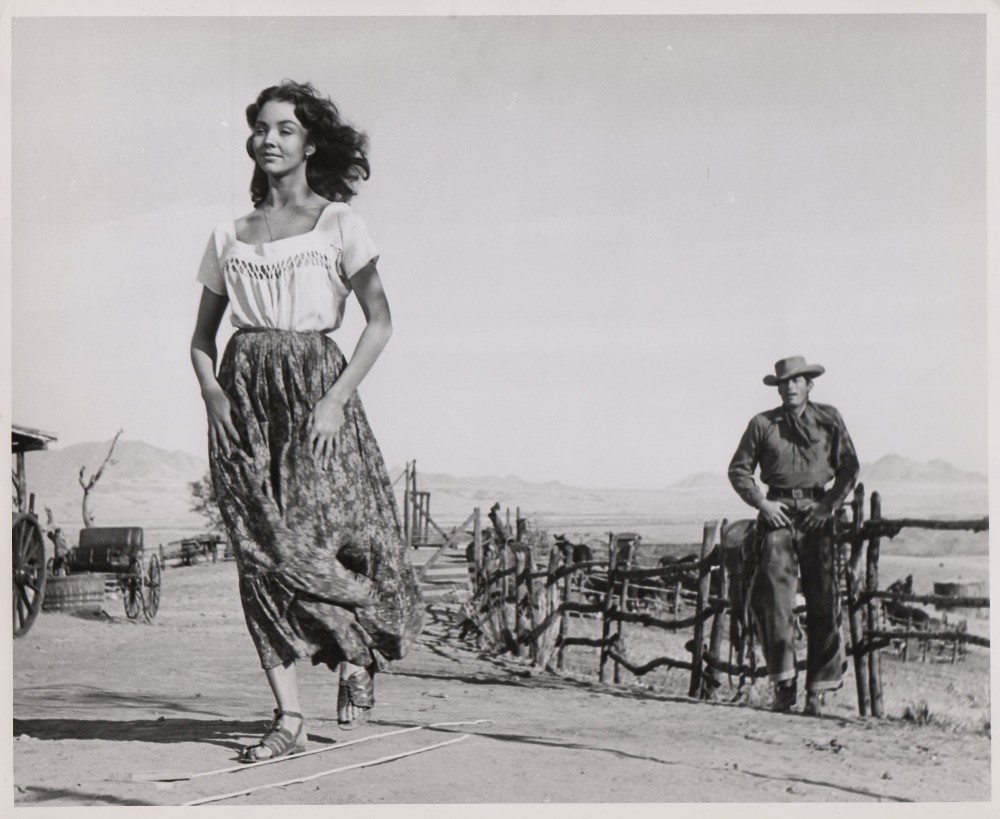
1946
White actress Gale Sondergaard is nominated for Best Supporting Actress for her role as Siamese character Lady Thiang in Anna and the King of Siam. White actors Rex Harrison and Linda Darnell also played Siamese characters in the film. (Siam is now known as Thailand.)
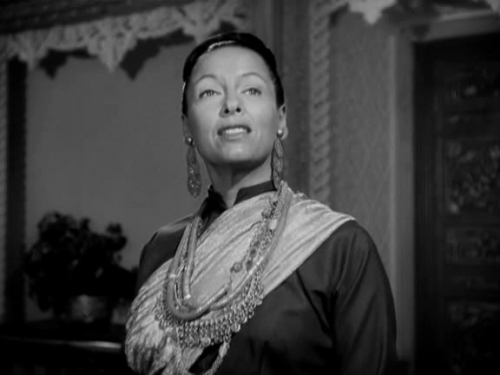
Gale Sondergaard
1947
First Hispanic Person Nominated For an Academy Award for Acting: Thomas Gomez is nominated as Best Supporting Actor for playing Pancho in Ride the Pink Horse. The white lead character befriends Pancho and is rewarded with Pancho’s loyalty and devotion. White actress Wanda Hendrix played Mexican-American character Pila.
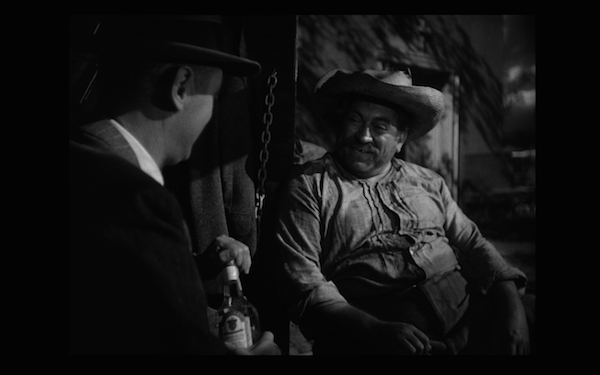
1949
White actress Jeanne Crain is nominated for a Best Actress for playing half African-American woman Pinky Johnson in Pinky. In the film, the grandmother who raised Pinky, an illiterate black laundress, is played by Ethel Waters, who was also nominated for an Academy Award. Black actresses Lena Horne and Dorothy Dandridge were interested in the role of Pinky, but were turned down in favor of Jeanne Crain. A fight over the censorship of this film by racist assholes in Texas went all the way to the Supreme Court.
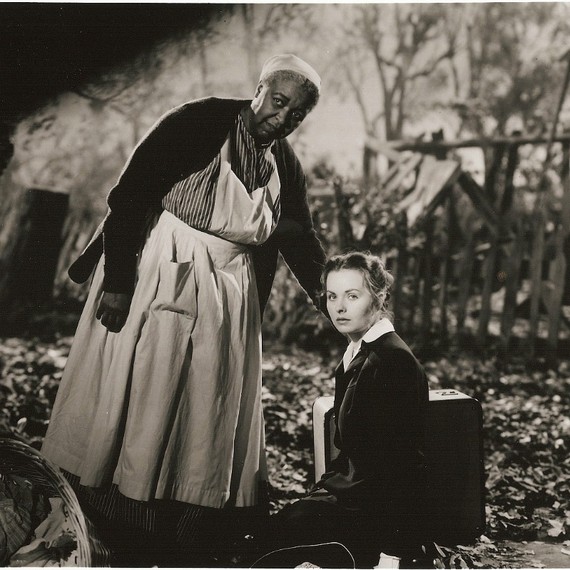
1950
White actor Jeff Chandler is nominated for Best Supporting Actor for playing Chiricahua Apache chief Cochise in Broken Arrow. White actress Debra Paget also played a Native American role in the film. Canadian First Nations actor Jay Silverheels was cast as Geronimo. Silverheels later went on to an iconic television role as Tonto, the faithful companion to The Lone Ranger.
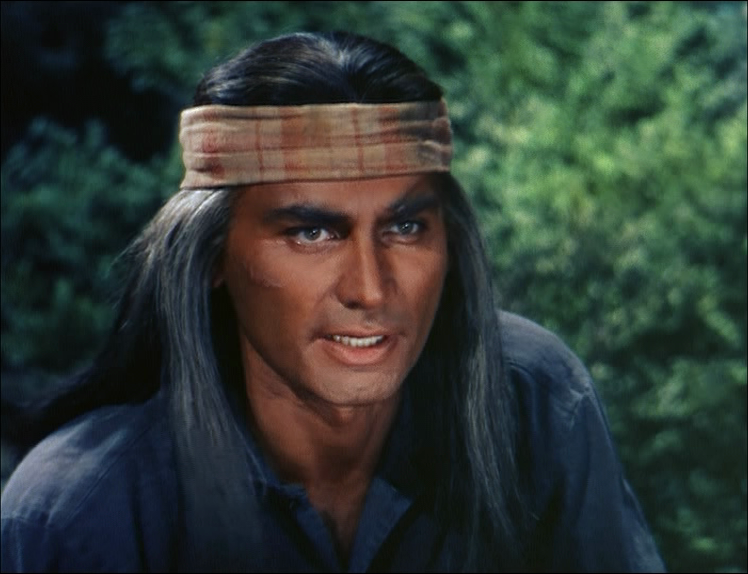
First Latino Person To Win An Academy Award for Acting: José Ferrer became the first Puerto Rican nominated for Best Supporting Actor when he got a nod in 1948 for playing the King of France in Joan of Arc, but he makes history again in 1950 when he wins Best Actor for playing another French character, Cyrano de Bergerac. He’d later be nominated for playing the French poet Henri de Toulouse-Lautrec in Moulin Rogue. He was the first Latino actor to be nominated more than once for an Academy Award.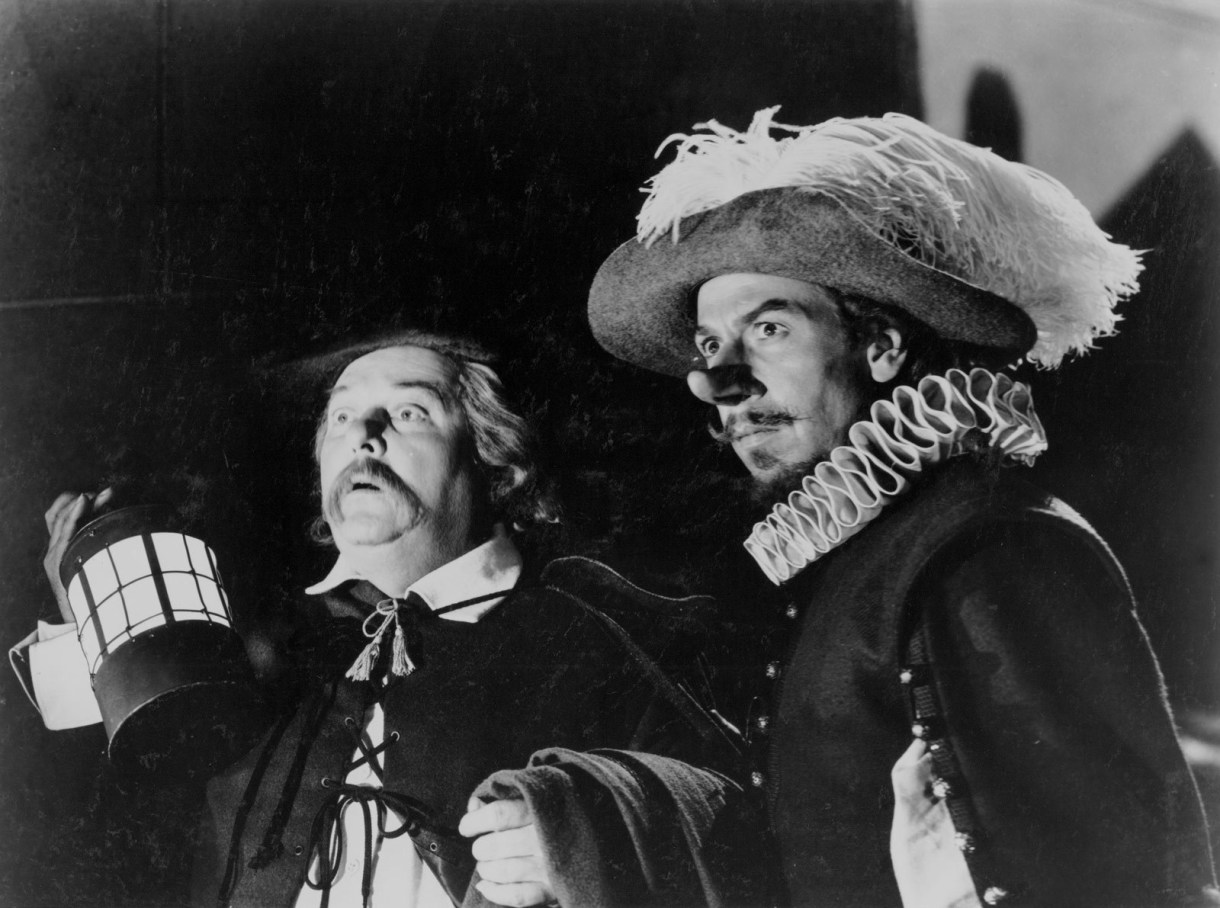
1952
Marlon Brando is nominated for Best Actor for his role as Mexican Revolutionary Emiliano Zapata in Viva Zapata! A blog I stumbled across while looking for images managed to encapsulate everything wrong with this type of casting when they wrote, “The black and white cinematography (and that glorious mustache) help make [Brando] look more like a Mexican, but it’s his acting deserves the credit for making his performance so believable. It’s not just that he is convincing in the role, he was even nominated for Best Actor, meaning that his performance as a Mexican was one of the best of the year.”
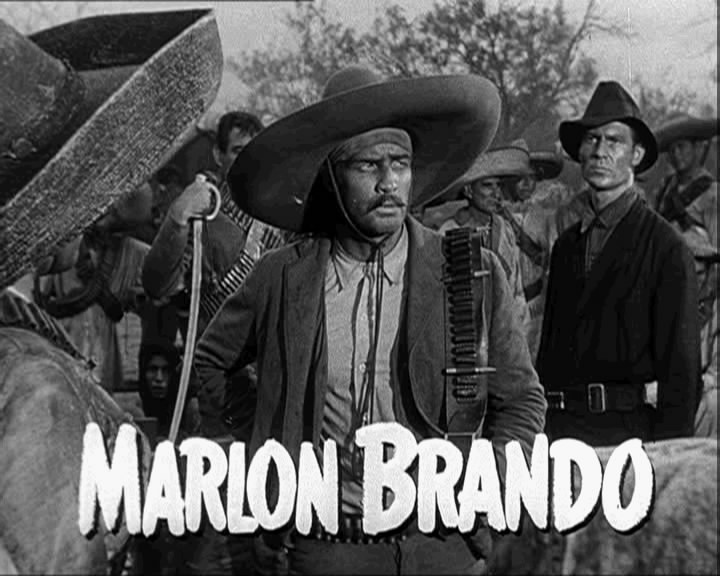
First Mexican Person To Win an Academy Award for Acting, First Latino Person To Win For Playing a Latino Character: Mexican-Irish actor Anthony Quinn was a three-time Oscar nominee; in 1957 for Wild Is the Wind (he played an Italian character), in 1964 for Zorba the Greek (he played a Greek character) and — the time he won — for “Viva Zapata! in 1952. This would be the first time a Latino actor would win an Academy Award for playing a Latino character. Most of the film’s other main characters were played by white actors — in fact, Pancho Villa was played by the same guy who voices Fred Flintstone.
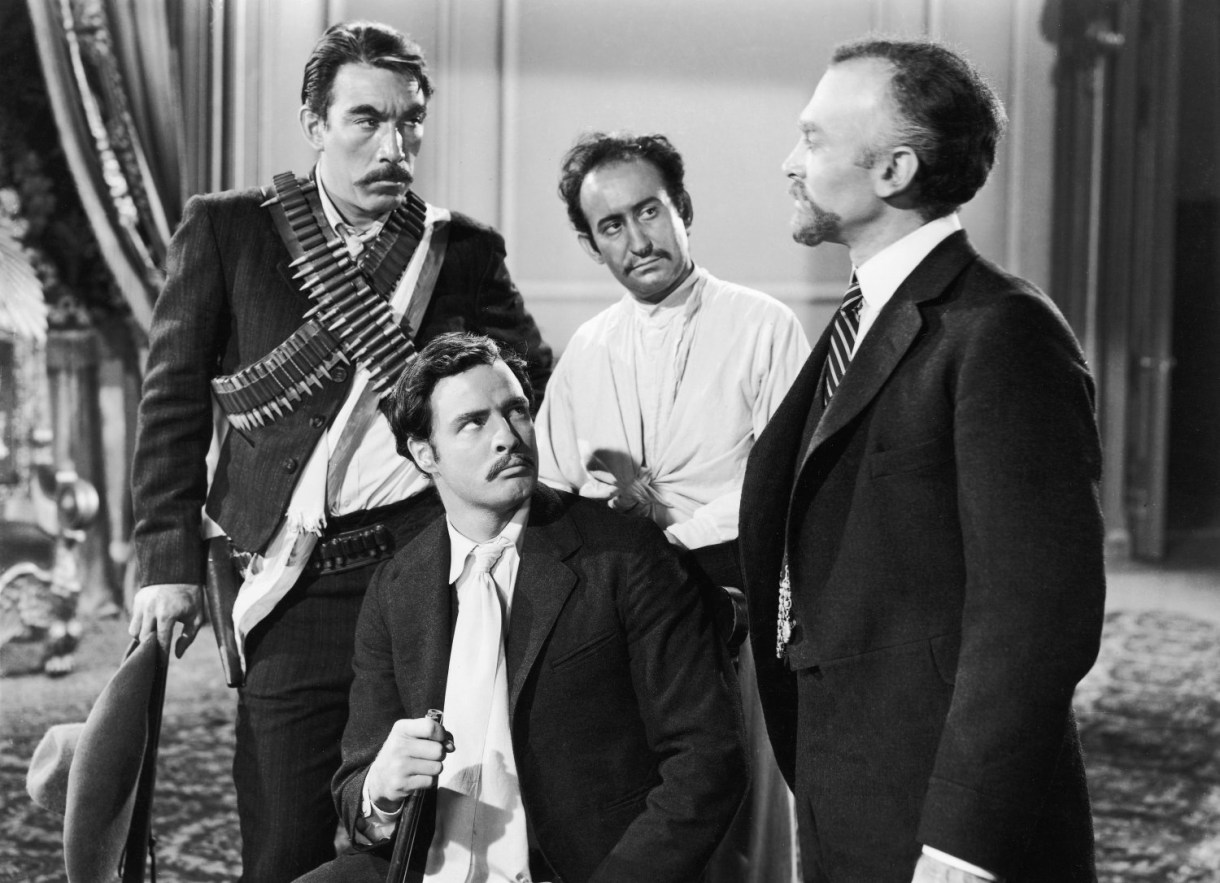
Marlon Brando is seated, Anthony Quinn is the one with the bullets
1954
First Mexican Woman To Be Nominated For An Academy Award for Acting: Mexican-American actress Katy Jurado was nominated for Best Supporting Actress for playing American Indian character Señora Devereaux in Broken Lace, the Comanche wife of Spencer Tracy’s character, Matt Devereaux. Her character is called “Señora” because, as her son tells his girlfriend, “people in town like to pretend she’s Spanish, figure it looks better.” The film is mostly centered on how racism against American Indians impacts her half-white son and white husband.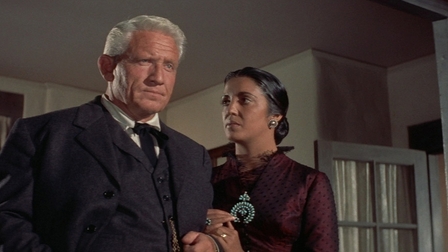
First Black Person Nominated For Lead Actress: Dorothy Dandridge is nominated for her role as Carmen Jones in Carmen Jones.
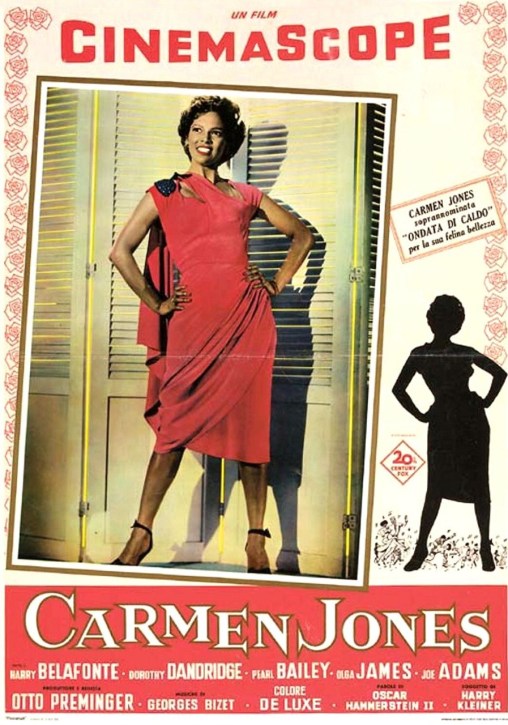
1955
White actress Jennifer Jones is nominated for Best Actress for playing Chinese doctor Dr. Han Suyin in Love is a Many Splendored Thing.
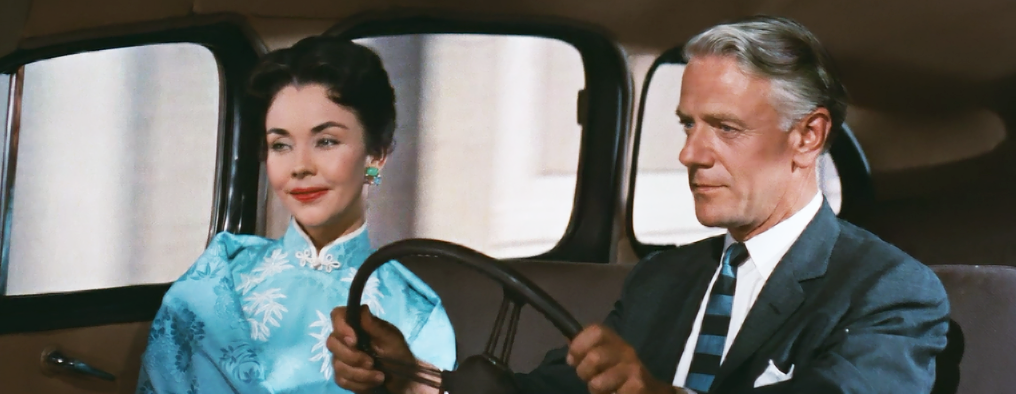
1956
The Ten Commandments, a film based on a Biblical story where characters of Middle Eastern descent were played by white actors, wins Best Picture.
Also in 1956, the legendary Russian actor Yul Brynnr earns a Best Actor Academy Award for playing King Mongkut of Siam (Siam is now known as Thailand) in The King and I, a role he played on Broadway and on screen and was very well known for.
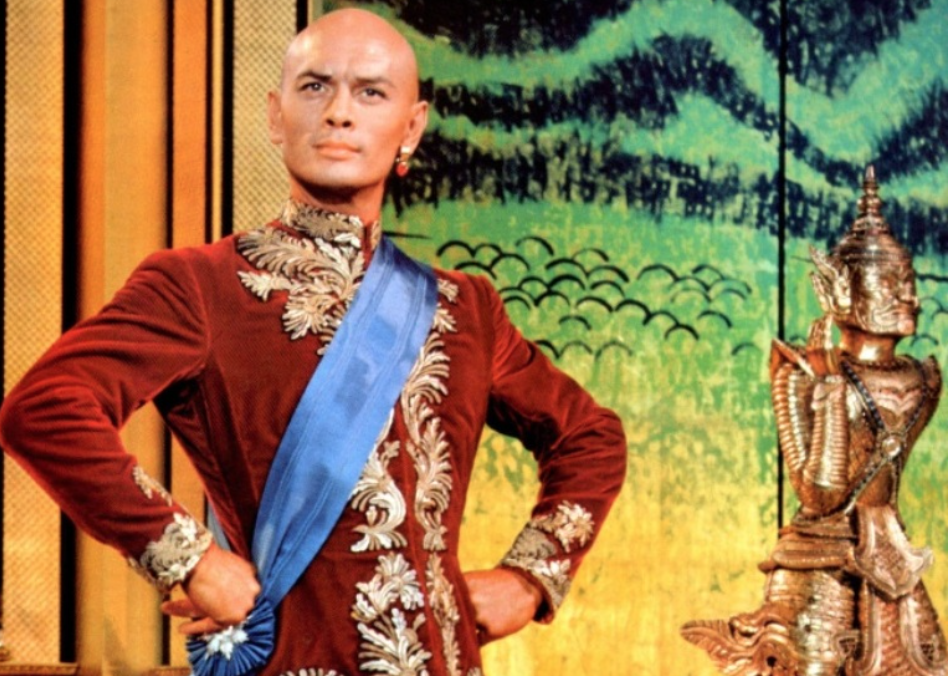
Brynner also portrayed Egyptian character Rameses II in The Ten Commandments.
But here’s a twist: Brynner claimed to be of part-Mongol parentage, but this probably wasn’t altogether true. Sources are conflicting on this matter, but it’s pretty intriguing, as Brynnr is one of only two actors listed on Wikipedia as an Asian Best Lead Actor nominee. (The other is Ben Kingsley, who is half-Indian.)
Sometimes Brynner said he was half-Japanese and half-Swiss. He consistently claimed that he was born “Taidje Khan” on a Russian island, which wasn’t true. In truth, he was born in the Far Eastern Republic of Russia, moved to China when he was 6, and Paris shortly thereafter. His father was Swiss/German/Russian and his mother was Russian. His paternal grandmother was said to maybe be of part Mongolian/Buryat ancestry.
1957
First Openly Asian-American Woman To Win An Academy Award for Acting, First Japanese-American Woman Nominated for an Academy Award for Acting: Japanese-American actress Miyoshi Umeki wns Best Actress for playing Katsumi, the wife of an American Airman, in Sayonara. The movie’s plot centered around two white soldiers who fell in love with Japanese women and are ostracized because of it it.
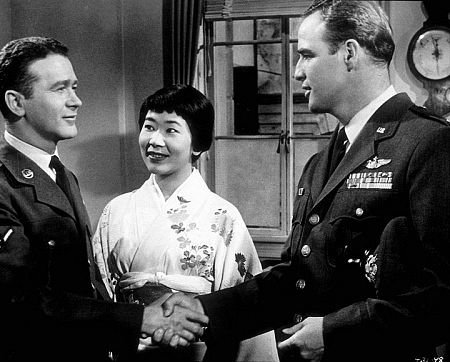
First Japanese-American man nominated for an Academy Award for Acting: Sessue Hayakawa, considered “the first Asian-American leading man,” is nominated for his role as Colonel Saito in The Bridge on the River Kwai.
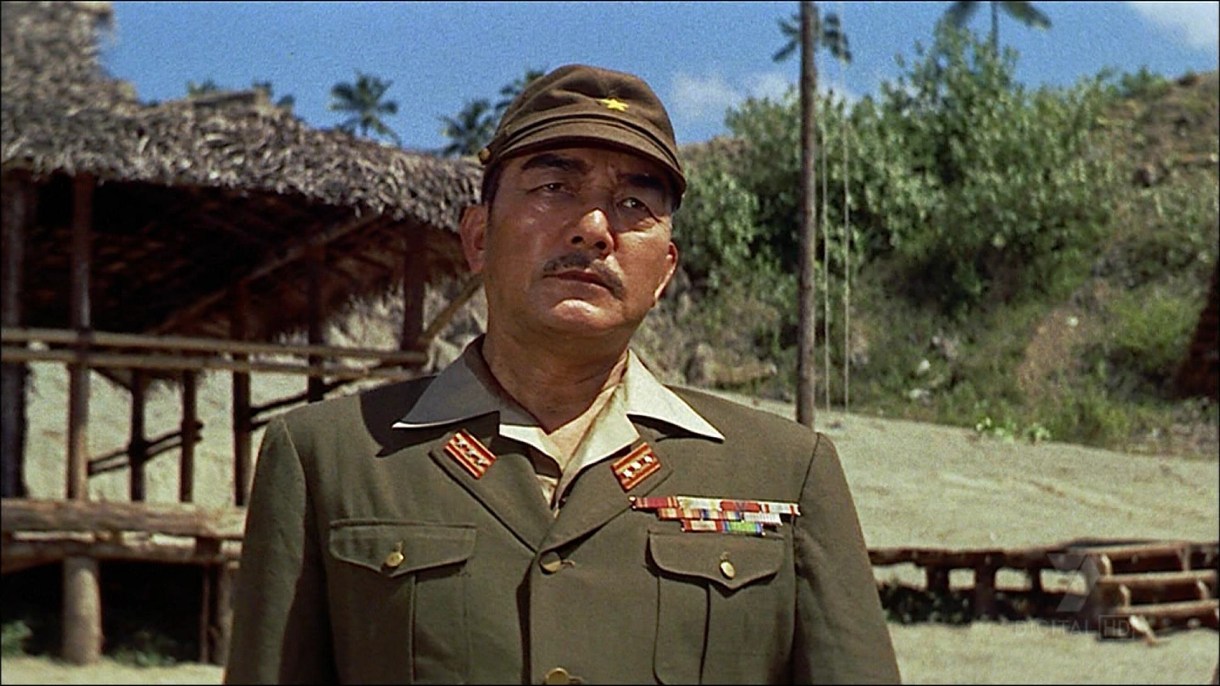
1958
First Black man nominated for an Academy Award for Acting: Sidney Poitier receives his first of three nominations for playing Noah Cullen, a black prisoner shackled to a white prisoner (played by Tony Curtis). The two escape prison when a truck crashes in The Defiant Ones and are forced to overcome their differences and work together to survive.
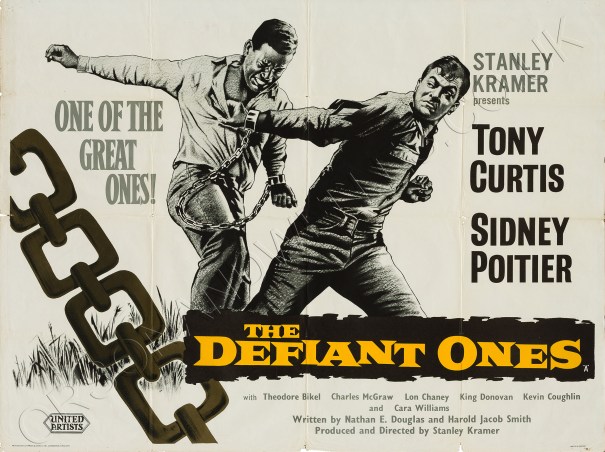
1959
White actor Hugh Griffith wins Best Supporting Actor for playing Middle Eastern character Sheik Ilderim in Ben-Hur. Ben-Hur also wins Best Picture.

Susan Kohner, a Czech-Mexican actress, is nominated for Best Supporting Actress for playing a white-passing African-American woman in the wildly successful film Imitation of Life. Black actress Juanita Moore is nominated for Best Supporting Actress for playing the single mother Sarah Jane rejects in order to pass as white.
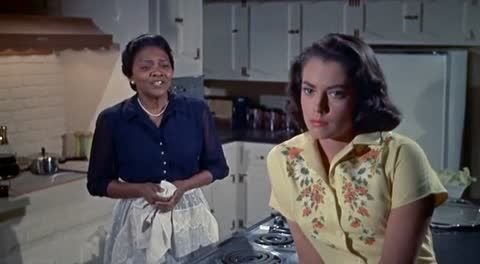
Juanita Moore and Susan Kohner
1961
White actor George Chakiris wins Best Supporting Actor for playing Puerto Rican gang member Bernardo Nuñez in West Side Story. Natalie Wood, a white actress, plays the Puerto Rican female lead in West Side Story, which also won Best Picture.
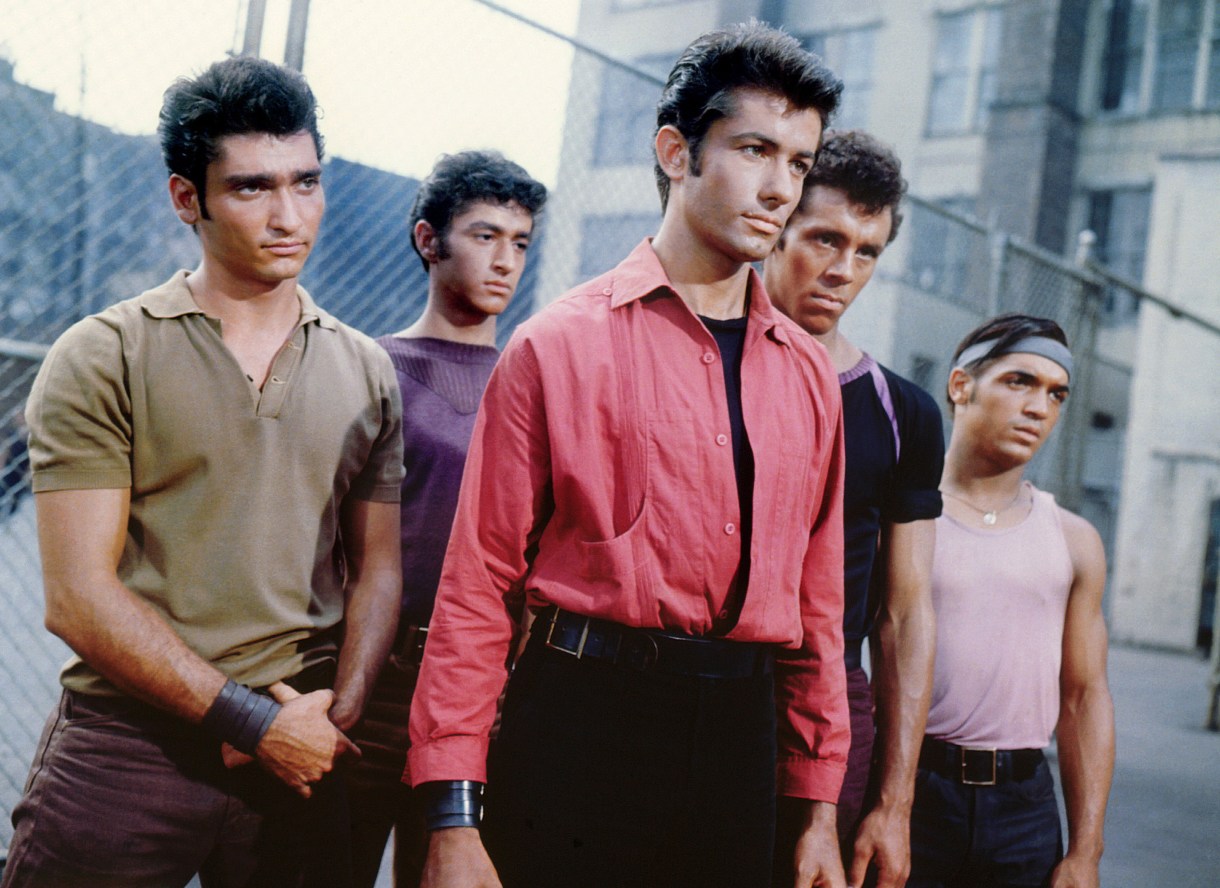
First Puerto Rican and first Latina Woman to Win an Academy Award for Acting for playing a Latina character: Rita Moreno wins Best Supporting Actress for playing Anita in West Side Story.
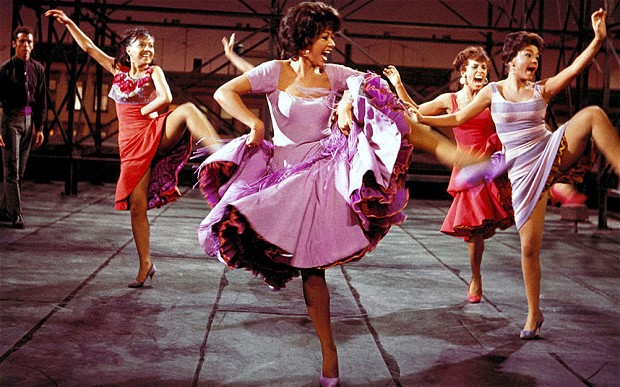
1962
White actor Alec Guinness gets a Best Actor Nomination for playing the Middle Eastern Prince Faisal in Lawrence of Arabia. Lawrence of Arabia also wins Best Picture.
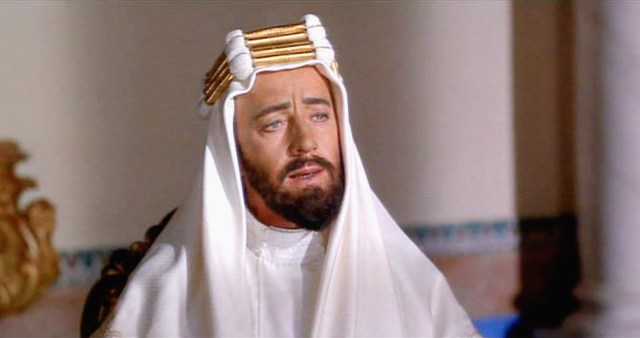
Omar Sharif becomes the first Egyptian and the first North African actor nominated for an Oscar with a Best Supporting Actor nod for Lawrence of Arabia.

Why is that man next to me so pale
1963
White actress Patricia Neal wins Best Actress for playing Alma in Hud. In the original novel, Alma’s character was a black housekeeper named “Halema,” but the director changed the character to be white because they didn’t think the film would sell with a Black actress at the helm.
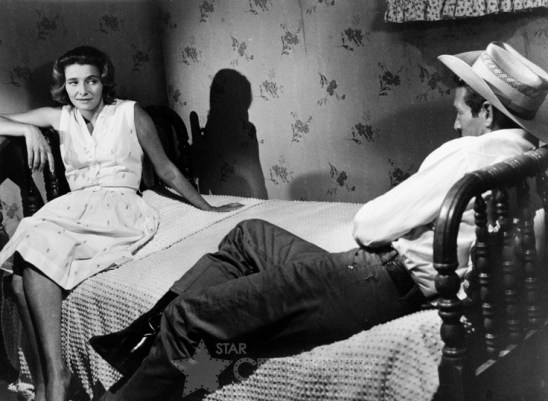
Another whitewashed remake of Cleopatra, this one starring Liz Taylor, wins Best Picture in 1963.
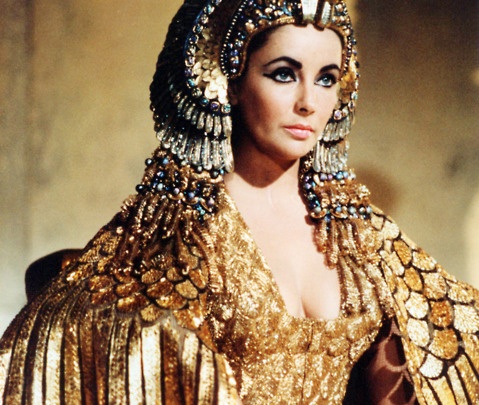
Sidney Poitier becomes the first black actor to win a Lead Acting Oscar for his performance in Lilies in the Field, where he plays a handyman who helps a bunch of nuns build a church.
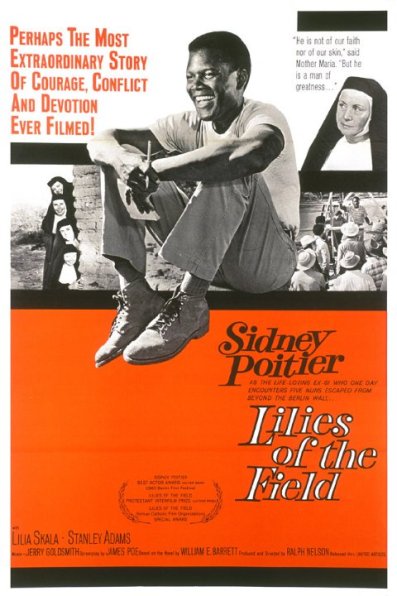
1965
White actor Laurence Olivier is nominated for Best Actor for playing Othello in Othello. Othello was described as “Moorish,” a term used at the time of the play’s writing to describe a wide array of darker-skinned people. This is just ridiculous:
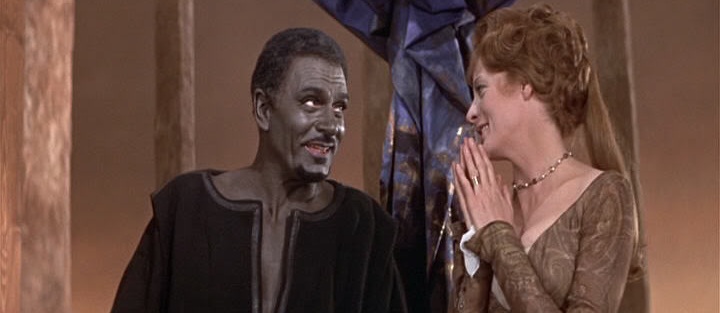
Did you hear the one about how blackface is the worst?
1967
Black actress Beah Richards is nominated for Best Actress in a Supporting Role for playing Mrs. Prentice in Guess Who’s Coming To Dinner, the mother of a black doctor played by Sidney Poitier whose white fiancé’s parents are not excited about the possibility of their daughter marrying a black person.
1970
First Native American Nominated for an Academy Award for Acting: Chief Dan George becomes the first Native American nominated for an Academy Award when he’s up for Best Supporting Actor for playing Old Lodge Skins in Little Big Man. Little Big Man is the story of Jack, a white boy raised by the compassionate Old Lodge Skins in his Cheyenne village after Jack’s parents are massacred by Pawnees. Prior to giving the role to George, it was offered to Marlon Brando, Paul Scofield and Laurence Olivier. All the extras were played by American Indians, however.
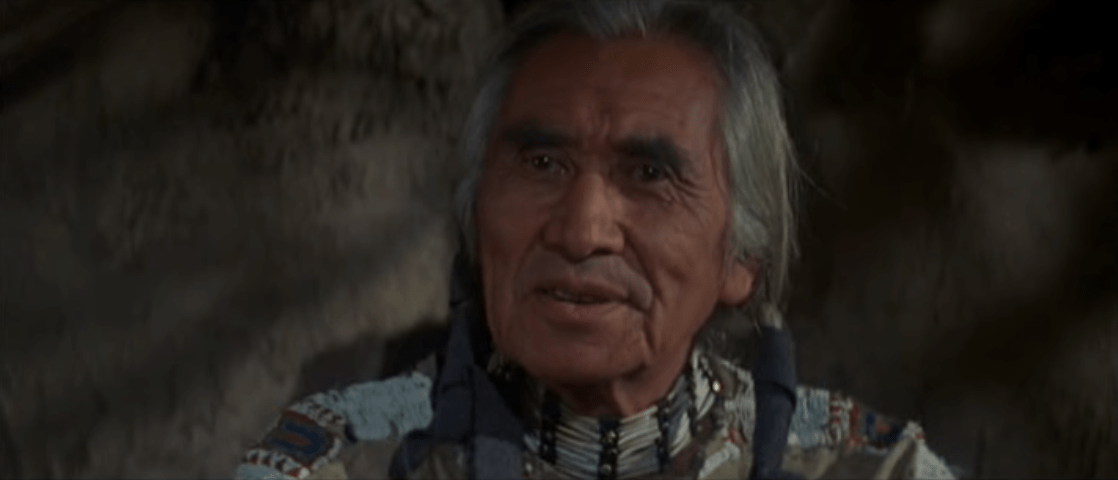
1971
Cherokee/Irish actor Ben Johnson wins Best Supporting Actor for playing a white pool hall owner in The Last Picture Show.
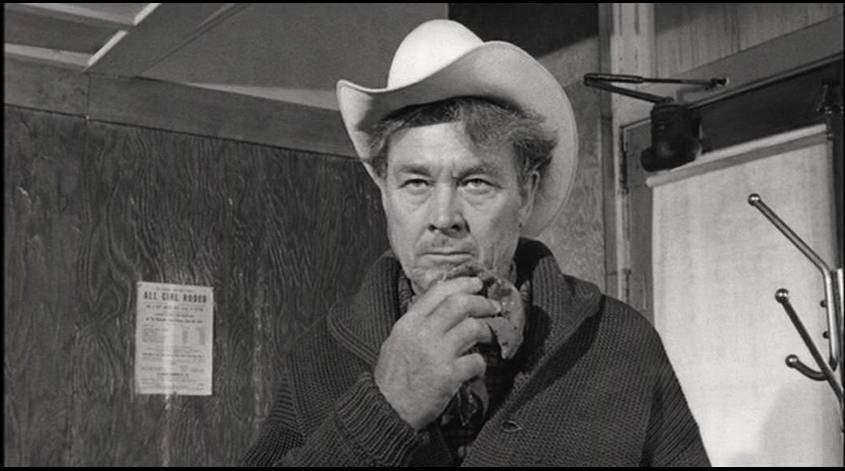
1972
Marlon Brando boycotts the Academy Awards ceremony to protest the treatment of Native Americans by the film industry, and sends Apache-Yaqui-Pueblo-French-German-Dutch actress and activist Sacheen Littlefeather to accept his award for Best Actor for The Godfather. Brando had written a 15-page speech inspired by the Wounded Knee Siege but the producer only gives Littlefeather 60 seconds, so she improvises and reads the rest backstage. The Academy forbids proxy acceptance going forward. This remains the only time a Native American woman has given an Oscar acceptance speech, although technically the Oscar was declined.
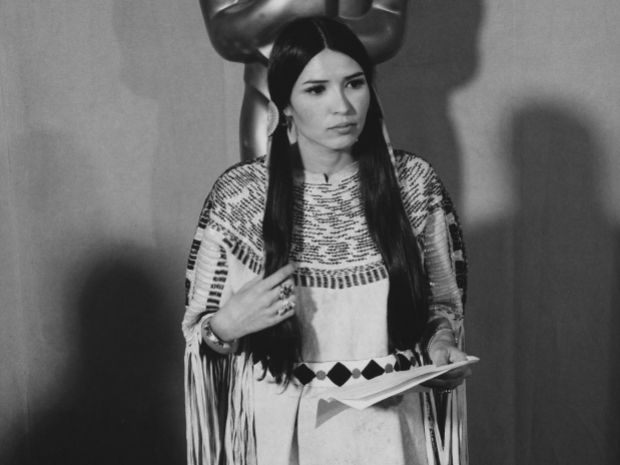
First film with African-American nominees for Best Actress and Best Actor: Black actor Paul Wildfield is nominated for Best Actor and Cicely Tyson for Best Actress for Sounder, about a sharecropping family in Louisiana whose father is sent to prison camp for a petty crime. It was well-reviewed, and according to Wikipedia “was praised as a welcome antidote to the contemporaneous wave of black films, most of which were considered low quality, low budget and exploitative. The film’s depiction of a loving family was hailed as a banner accomplishment for black filmmakers and audiences.”
Diana Ross is nominated for Best Actress for playing Billie Holiday in Lady Sings the Blues. This was the first time more than one black actress was nominated for Best Actress in the same year.
They lost to Liza Minelli for Cabaret.
Between 1975 and 1980, no actors of color are nominated for Oscars.
1981
Indiana Jones and the Raiders of the Lost Ark is nominated for Best Picture. It includes a Welsh actor, John Rhys-Davies, playing an Arab-Egyptian character named Sallah Mohammed Faisel el-Kahir.

1982
Linda Hunt wins Best Supporting Actress for playing an Chinese-Australian person with dwarfism named Billy Kwan in The Year of Living Dangerously. Yup.
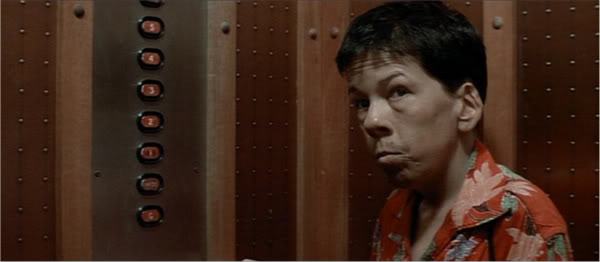
Ben Kingsley wins a Best Actor statue for starring in Gandhi, which also wins Best Picture. In doing so, he becomes the first East, Southeast or South Asian actor to win an Academy Award for Lead Actor. Kingsley’s mother is British and his father is Indian, and his skin was darkened to play the role.
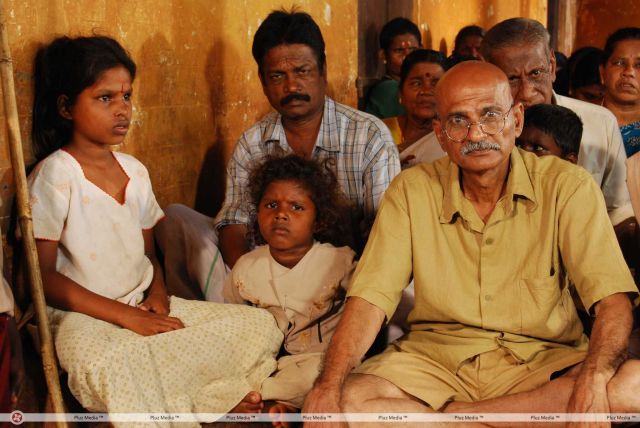
Louis Gossett, Jr, is the first black man to win Best Actor in a Supporting Role for playing a Naval Officer Trainer in An Officer and a Gentleman.
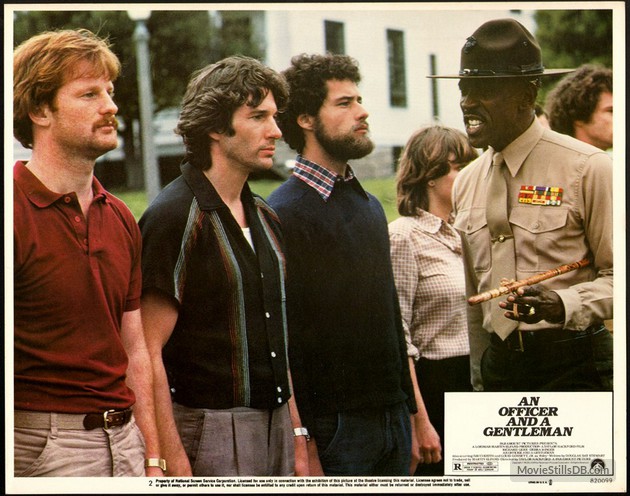
1984
This was a big year for movies that weren’t (just) about white people: Best Picture nominees included A Soldier’s Story, with a mostly-black cast set in Louisiana near the end of World War II; The Killing Fields, set in Democratic Kampuchea during Vietnam with a Cambodian actor, Haing S. Ngor, winning Best Supporting Actor; and A Passage to India, set in India during the British Raj. Although only white actors were nominated for A Passage to India, three actors of color were nominated for Best Supporting Actor in 1984. Japanese-American actor Pat Morita was nominated for playing Mr. Miyagi in The Karate Kid.
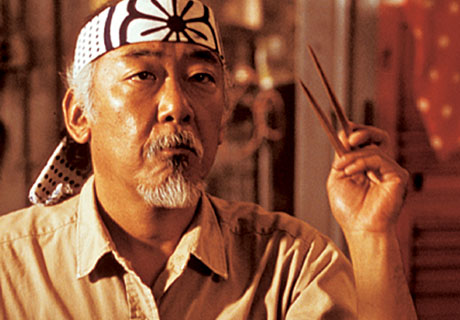
Between Haing S. Ngor’s win in 1984 and Youn Yuh-jung’s in 2021; no East, Southeast or South Asian actors would win an Oscar.
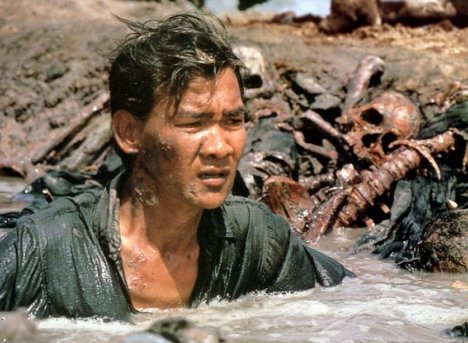
Haing S. Ngor in “The Killing Fields”
1985
The Color Purple is nominated for 11 awards, including Best Picture and acting nods for black actresses Whoopi Goldberg, Oprah Winfrey and Margaret Avery. It does not win in any category.
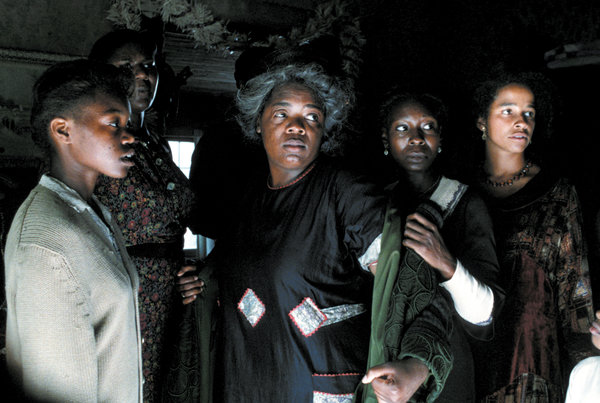
Kiss of the Spider Woman, a book adaptation from Brazilian director Héctor Eduardo Babenco, is nominated for Best Picture, and white actor William Hurt wins a Best Actor Oscar for playing a gay Latino character named Luis Molina. Molina is in a Brazilian prison with leftist revolutionary Valentin Arregui, played by Puerto Rican actor Raúl Juliá.
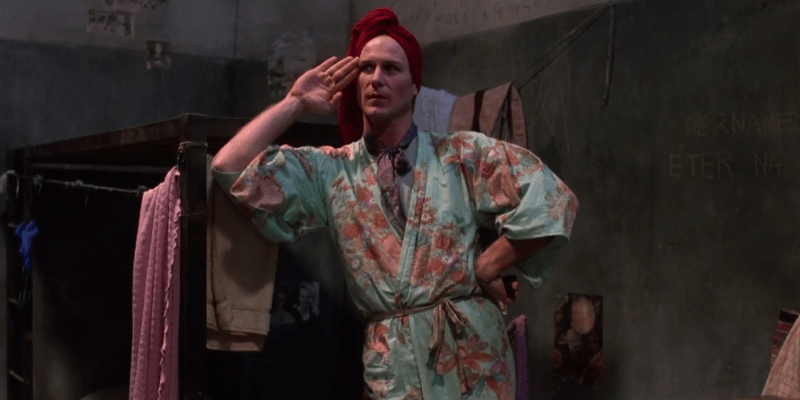
William Hurt as Luis Molina
But Best Picture and a bunch of other awards went to Out of Africa, an intensely problematic colonialist fantasy that has since inspired many themed weddings and a Taylor Swift music video.
In fact, despite the many people of color represented in top feature film categories that year, all the winners were white.
1987
The Last Emperor, produced by Jeremy Thomas, wins Best Picture without acquiring a single acting award nomination, one of 11 films in Oscar History to do so. It also becomes one of the most nominated films of all time. All in all, The Last Emperor wins 9 Oscars, representing 15 different human beings, 13 of whom were white. (The two non-white winners were Japanese composer Ryuichi Sakamoto and Chinese composter Cong Su.)
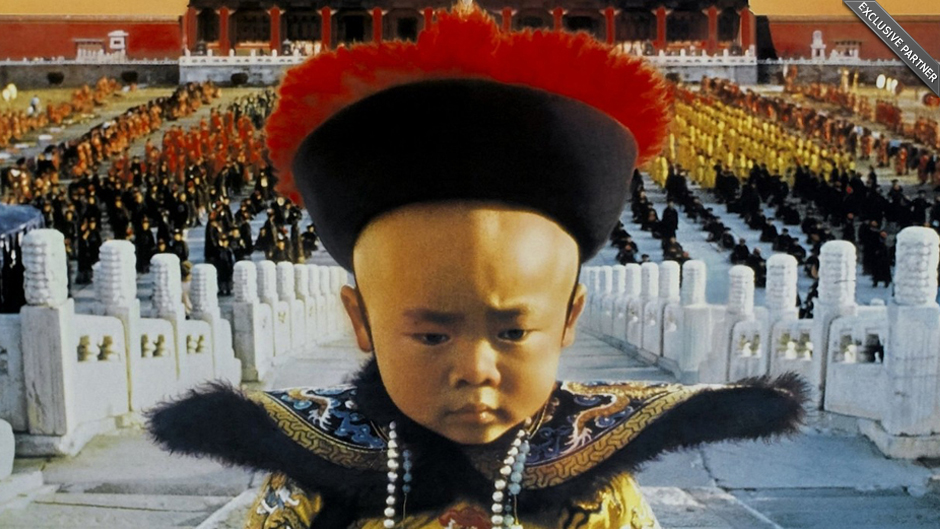
At this point in Oscar history we start seeing a lot less white people playing people of color and a lot more white people telling stories about people of color that are centered on white people or include white savior elements.
Cry Freedom, a standby on the white savior list, earns Denzel Washington his first Academy Award nomination, for Best Supporting Actor.
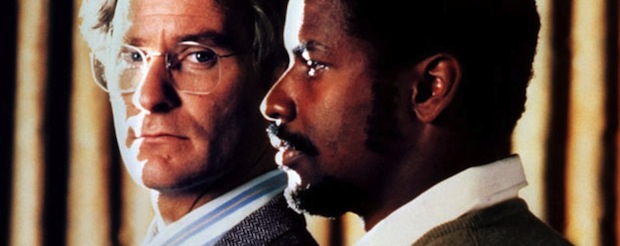
Morgan Freeman is also nominated for Best Supporting Actor for playing a pimp named “Fast Black” in Street Smart.
Argentinian actress Norma Aleandro is nominated for Best Supporting Actress for playing a Mexican character, Florencia Sánchez Morales, in Gaby: A True Story.
1988
White actors Gene Hackman and Frances McDormand are nominated for Acting Oscars for Mississippi Burning, a white savior narrative which sees two FBI agents investigating the murder of a black Civil Rights Organizer in the south. Director Alan Parker said of the choice to center the story on white people, “The two heroes in the story had to be white. That is a reflection of our society as much as of the film industry. At this point in time, it could not have been made in any other way.”
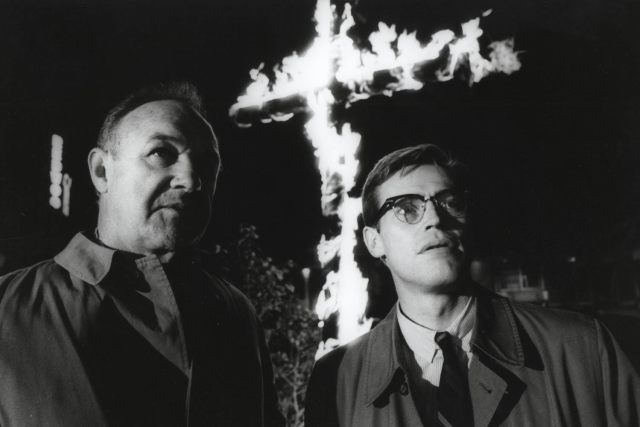
Mexican-American actor Edward James Olmos is nominated for Best Actor for playing math teacher Jamie Escalante in Stand and Deliver.
1989
Denzel Washington wins an Oscar for Best Actor in a Supporting Role for Glory, playing an escaped slave who joins a platoon during the Civil War. It’s a good movie but like many of Ed Zwick’s flicks, there’s some serious white savior narratives going on.
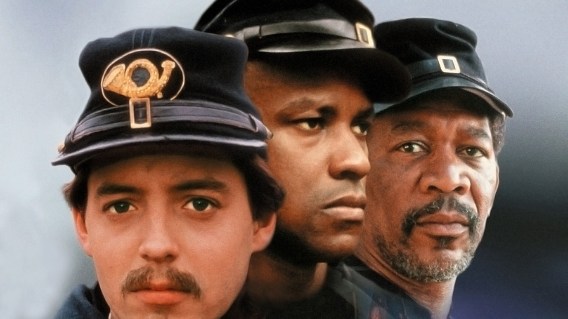
1990
Dances With Wolves, the epitome of a white savior narrative, wins Best Picture. Canadian First Nations actor Graham Greene is nominated for Best Supporting Actor for his role and many other Native actors appeared in the film. White actors Kevin Costner and Mary McDonnell also earn nominations, and Kevin Costner wins for Best Director.
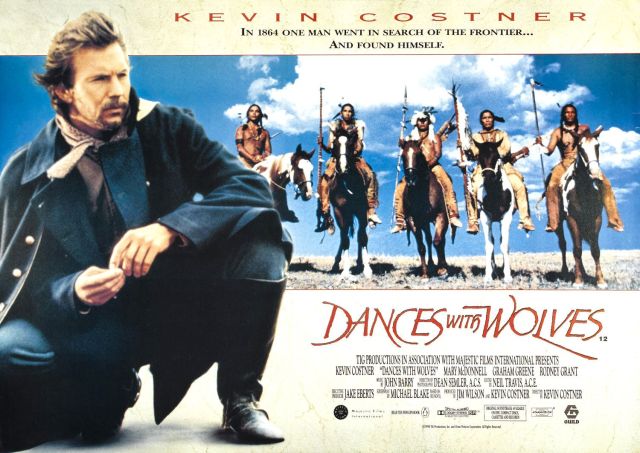
Whoopi Goldberg wins Best Supporting Actress for playing Oda Mae Brown in Ghost, a con artist posing as a medium who helps Patrick Swayze’s ghost communicate with his wife.
1992 – 1994
Over this span of time six black actors, one Puerto Rican actress (Rosie Perez, Fearless) and one Chinese-Canadian actress (Jennifer Tilly, Bullets Over Broadway) are nominated for Academy Awards for acting in films including Shawshank Redemption, Malcom X, What’s Love Got To Do With It, The Crying Game and Pulp Fiction. All acting winners for all three years are white. No actors of color were nominated in 1995 or 1997.
1996
Cuba Gooding Jr. triumphantly wins Best Actor in a Supporting Role for playing Rod Tidwell in Jerry Maguire, a rare case of a black actor nominated or winning for a comedic role. (Whoopi Goldberg in Ghost might be the other best example of this.)
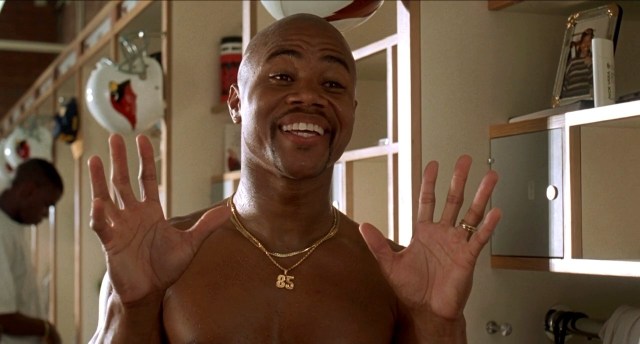
Black British actress Marianne Jean-Baptise is nominated for Best Supporting Actress for Secrets & Lies, the first Black British actress to get a nomination.
2000
The Green Mile, a film described by AlterNet as “so racist because its storyline is one of the most unbelievable in Hollywood history. It is only believable through the illogic of racist ideas,” is nominated for Best Picture. Black actor Michael Clarke Duncan is nominated for Best Supporting Actor for playing John Coffey, a character Alternet describes as a “picture perfect rendition of racists beloved archetypal ‘Magic Negro.'”
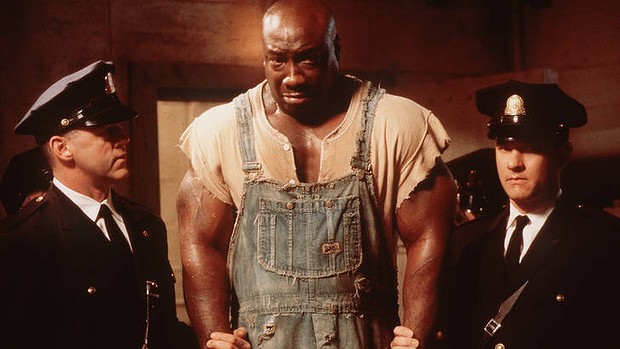
Denzel Washington is also nominated for Best Actor for playing boxer Rubin Cartner in the The Hurricaine. All acting winners are white.
2001
Benicio del Toro wins Best Supporting Actor for Traffic.

Crouching Tiger, Hidden Dragon is nominated for Best Picture and nine other Academy Awards. Taiwanese-American director Ang Lee wins Best Director, but no actors from the film are nominated for Academy Awards.
2002
First Black Woman to Win Lead Actress Oscar: Halle Berry wins Best Actress for Monster’s Ball!
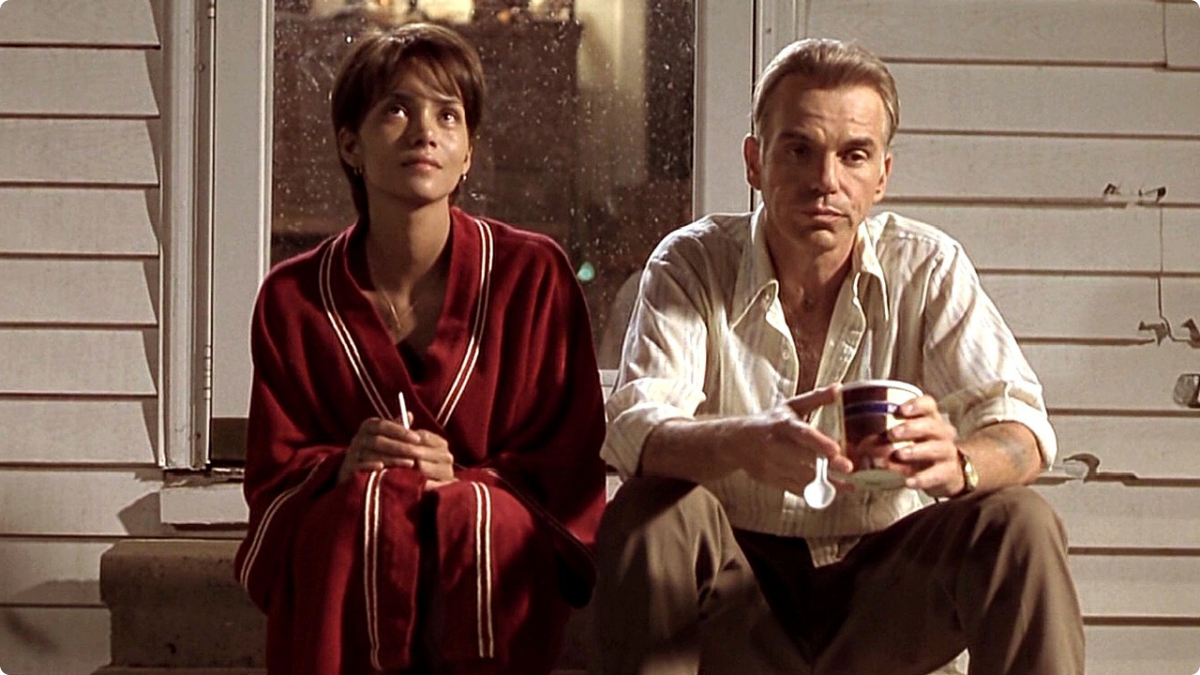
First Black Actor to Win an Oscar for a Movie Directed By A Black Person: Denzel Washington wins Best Actor for Training Day (beating Will Smith, nominated for Ali).
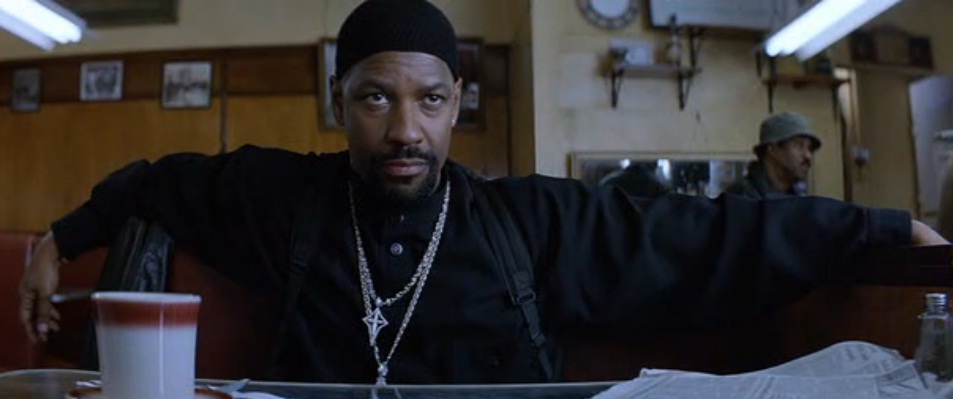
White actress Jennifer Connelly wins Best Supporting Actress for playing El Salvadorian Alicia Nash in A Beautiful Mind.
2003
Queen Latifah is nominated for Best Supporting Actress for Best Picture winner Chicago.
2004
First Pacific Islander Nominated for an Acting Award: Australian-Māori actress Keisha Castle-Hughes becomes the first Pacific Islander nominated for an Academy Award for Acting when she is nominated for her performance in Whale Rider, as a 12-year-old Māori girl who wants to be chief of her tribe. This also makes her the youngest Academy Award nominee for Lead Actress.
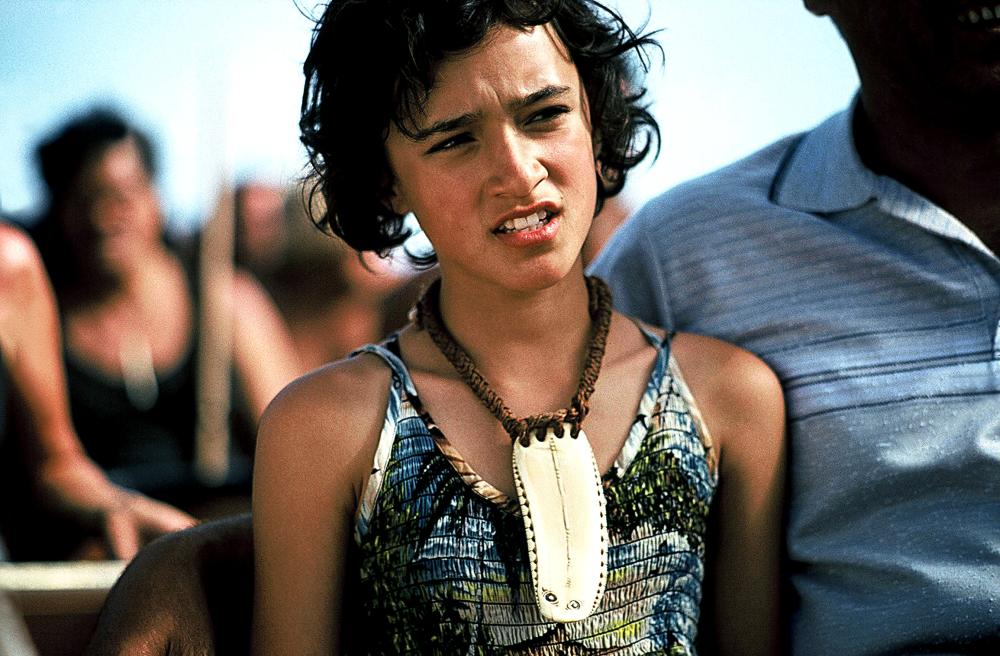
First Middle Eastern Actress Nominated for an Academy Award for Acting: Iranian actress Shohreh Aghdashloo is nominated for playing Nadereh “Nadi” Behrani in The House of Sand and Fog.
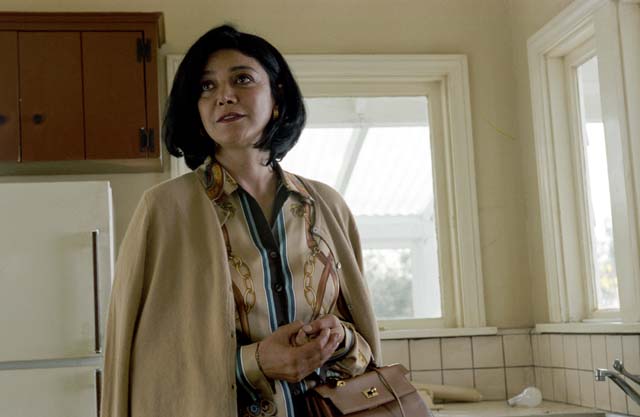
Black actor Djimon Hounsou is nominated for Best Supporting Actor for In America. He is the first black actor born in Africa to be nominated.
Benecio Del Toro is nominated for Best Supporting Actor for 21 Grams.
Japanese actor Ken Watanabe is nominated for Best Supporting Actor for playing Lord Katsumoto in The Last Samurai. It’s another film from Glory‘s Ed Zwick, with similar white savior overtones (white army official personally embodies an effort to liberate people of color). Tom Cruise, despite not being the Last Samurai referenced in the title, was made to seem that way on the movie poster, to much confusion.
All acting winners are white.
2005
Six actors of color are nominated in 2004. Morgan Freeman wins Best Supporting Actor for Million Dollar Baby and Jamie Foxx is nominated twice — Supporting for Collateral, and Best Actor for Ray, which he wins. AND Don Cheadle is nominated for Best Actor for Hotel Rwanda! AND AND AND Sophie Okonedo is nominated for Best Supporting Actress for Hotel Rwanda! Also, Catalina Sandino Moreno is the first Colombian actress nominated for an oscar when she gets a Best Actress nod for Maria Full of Grace.
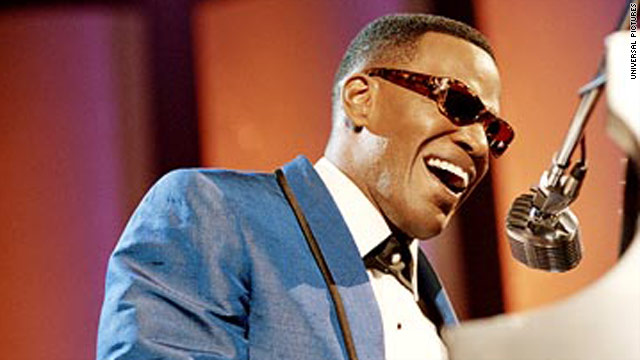
Jamie Foxx in “Ray”
2006
Black actor Terrence Howard is nominated for Best Actor for Hustle & Flow.
2007
Six actors of color are nominated in 2006.
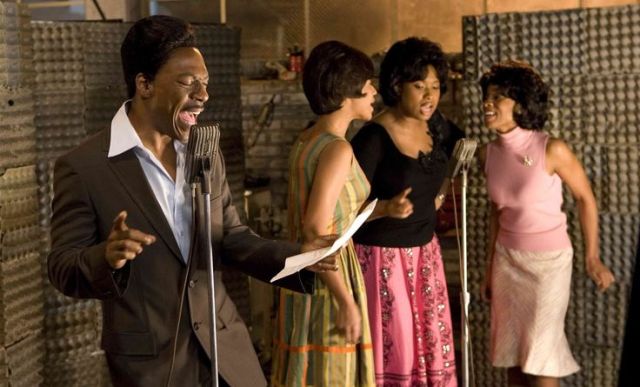
“Dreamgirls”
Forest Whittaker wins Best Actor for Last King of Scotland, Jennifer Hudson wins Supporting Actress for Dreamgirls, Will Smith is nominated for Best Actor for The Pursuit of Happyness and Eddie Murphy for Best Supporting for Dreamgirls.
Mexican actress Adriana Barraza and Japanese actress Rinko Kikuchi are nominated for Alejandro González Iñárritu’s Babel.
White director Paul Greengrass is nominated for United 23, which features British-Egyptian actor Khalid Abdalla.
Letters From Iwo Jima, a Japanese-American film based on a book by Tadamichi Kuribayashi, is nominated for Best Picture and its director, Clint Eastwood, is nominated for Best Director. The film was produced by Clint Eastwood, Robert Lorenz, and Steven Spielberg, with an Oscar-nominated Screenplay by Japanese-American screenwriter Iris Yamashita and Paul Haggis. The majority of the film’s cast are Japanese characters played by Japanese actors, including Ken Watanabe. No actors are nominated for Academy Awards for Letters From Iwo Jima.

Director Clint Eastwood, interpreter Yuki Ishimaru, and actor Ken Watanabe on the set of “Letters From Iwo Jima.”
Leonardo DiCaprio is nominated for Best Actor in Blood Diamond, a white savior narrative in which he plays a racist white mercenary who rescues a Sierra Leonese prisoner and his son from revolting rebels. As written in a review of the film in The Age, “If there is anything black people the world over have learned from Hollywood – and there isn’t a whole lot – it’s that no matter how bleak the situation seems, they can always rely on some resourceful, charismatic white person to bail them out.” Black actor Djimon Hounsou, who played the prisoner befriended by DiCaprio, is also nominated for an Oscar.
2008
Black actress Ruby Dee is nominated for Best Supporting Actress for playing the mother of an up-and-coming crime lord in American Gangster.
2009
Taraji P. Henson is nominated for Supporting Actress for playing Queenie, Benjamin Button’s caretaker in The Curious Case of Benjamin Button. Viola Davis is nominated for playing Mrs. Miller in Doubt.
2010
Sandra Bullock wins Best Actress for The Blind Side, another pitch-perfect example of a white savior narrative. Her character is a white mother and football fan who takes in and raises black future Baltimore Ravens offensive tackle Micheal Oher. The Blind Side is also nominated for Best Picture.
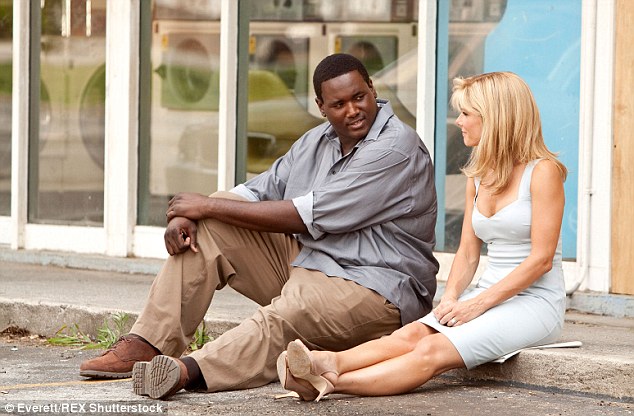
Also nominated for Best Picture in 2009 is Avatar, which embodies every white savior narrative ever. In i09, Annalee Newitz writes that Avatar “is the essence of the white guilt fantasy, laid bare.”
Mo’Nique wins Best Actress in a Supporting Role for playing Precious’s abusive mother in Precious, for which Gabourey Sidibe is also nominated but loses (to Sandra Bullock). Morgan Freeman gets a Best Actor nod for playing Nelson Mandela in Invictus.
Slumdog Millionaire, a British film shot in India with a majority Indian cast, wins Best Picture! It is one of 11 films to win Best Picture without acquiring any acting nominations.
2011
Pilipina-Jewish actress Hailee Steinfeld is nominated for Best Supporting Actress for True Grit.
2012
The Help, another white savior story, is nominated for Best Picture. Black actress Octavia Spencer wins Best Supporting Actress for playing outspoken maid Minny Jackson.
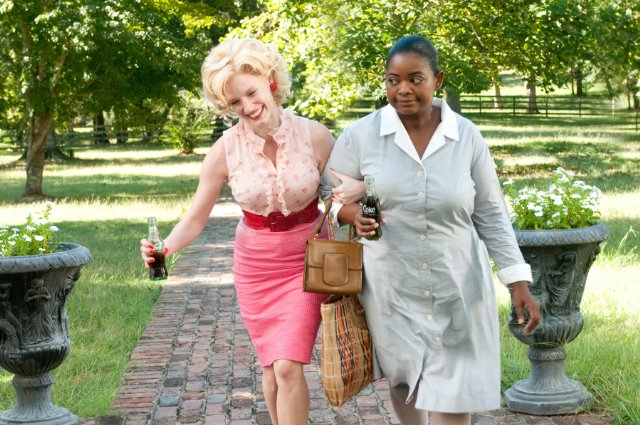
Viola Davis is nominated for Best Actress for playing maid Aibileen Clark. In The New York Times’ recent analysis of which black characters earn Oscar nominations, it is noted that “in the history of the Oscars, 10 black women have been nominated for best actress, and nine of them played characters who are homeless or might soon become so. (The exception is Viola Davis, for the 2011 drama “The Help.”)”
2013
White actor Ben Affleck plays Hispanic CIA Agent Tony Mendez in Argo, which inexplicably wins Best Picture.
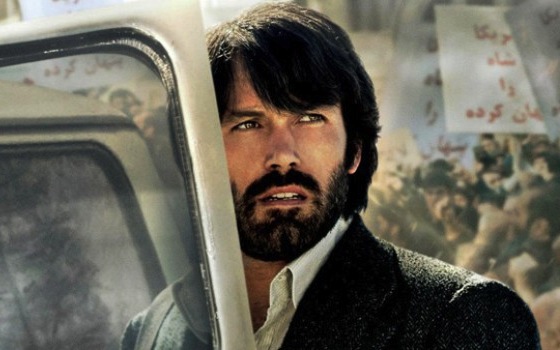
White director Quentin Tarantino and white actor Christopher Waltz win Oscars for Django Unchained, the story of a white bounty hunter and the slave he freed, Django, who set out to free Django’s wife from a sadistic plantation owner. No black actors are nominated.
Black actress Quvenzhané Wallis becomes the youngest actress nominated for a Lead Actor Oscar for Beasts of the Southern Wild. Denzel Washington is nominated for Best Actor for Flight, but loses to Daniel Day-Lewis‘s Abraham Lincoln in Lincoln.
Ang Lee’s Life of Pi is nominated for Best Picture. Although it has a notably small cast (mostly just um, a boy and his tiger), this is now the fifth time a movie with a majority-Asian cast was nominated for Best Picture but not any acting awards.
All acting winners are white.
2014
12 Years a Slave wins Best Picture. Director Steve McQueen becomes the first black director to have their movie win Best Picture.
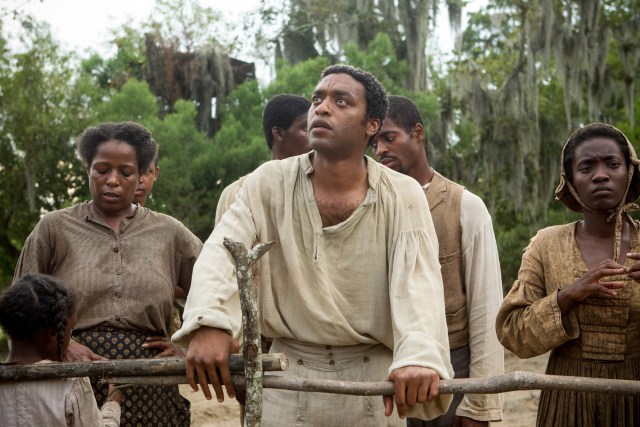
TWELVE YEARS A SLAVE
Chiwetel Ejiofor is nominated for Best Actor for playing Solomon Northup in 12 Years a Slave and Lupita Nyong’o wins for Best Supporting Actress for her role in the film. Barkhad Abdi is nominated for Best Supporting Actor for playing a Somali pirate in Captain Phillips. Also, Mexican director Alfonso Cuarón wins for Best Director for Gravity, a movie about a white woman lost in outer space.
No black actors have been nominated since this year.
2015
Selma receives a Best Picture nominee but nobody in the majority-black cast receives an acting nomination, nor does their black female director Ava DuVernay. In fact, no actors of color are nominated in 2014.
2016
In Best Picture Nominee The Martian, white actress Mackenzie Davis plays Mission Control satellite planner Mindy Park, who was Korean-American in the novel upon which the movie is based.
The #OscarsSoWhite campaign begins in reaction to the complete exclusion of people of color from Oscar nominations.
2017 Oscars
The Oscars take a giant leap forward when Moonlight becomes the first film with an all-black cast and the first LGBT-themed film to win Best Picture. Black actor Mahershala Ali becomes the first Muslim actor to win an Academy Award when he takes Best Supporting Actor for Moonlight.
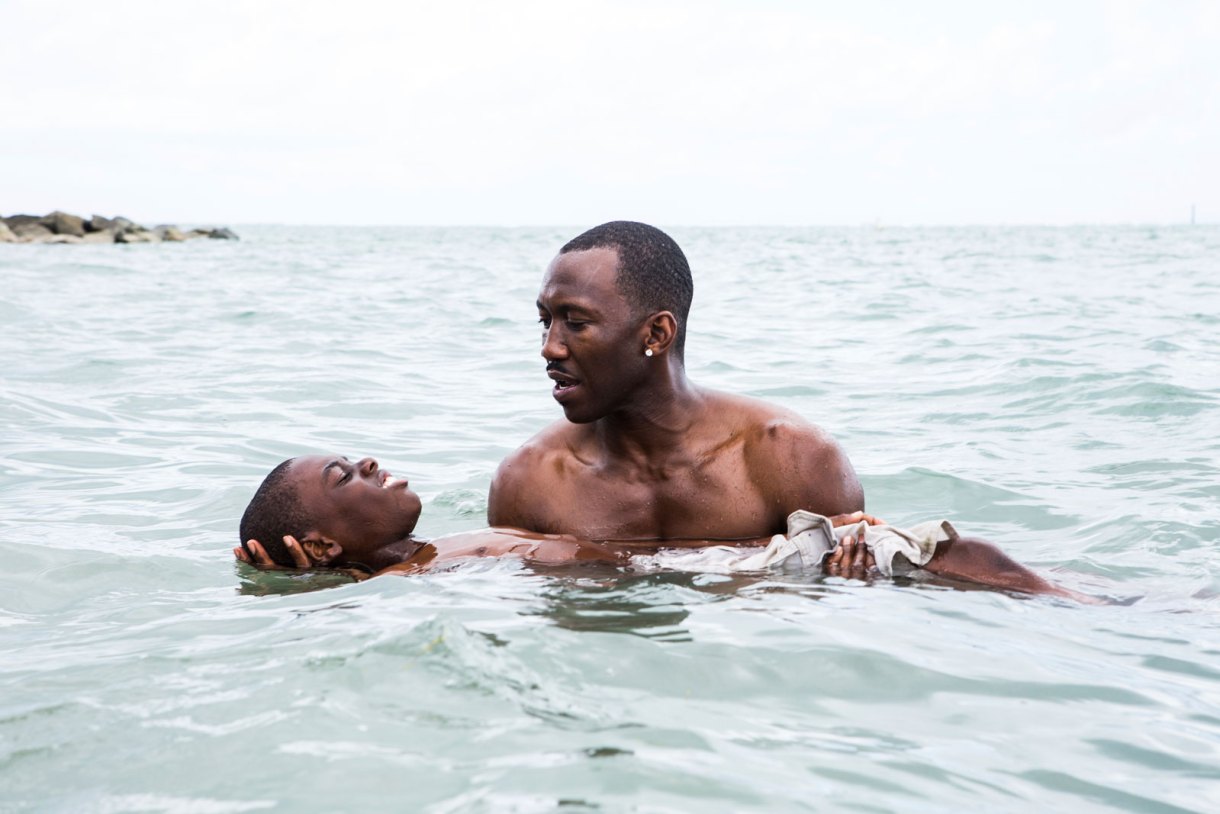
Viola Davis wins Best Supporting Actress for Fences, making her the first black person to achieve the Triple Crown of Acting with her Oscar, Emmy and Tony wins. In all, seven people of color (six Black actors and one Indian actor) are nominated for acting awards.
2018
Get Out is nominated in four categories — Best Picture, Best Director and Best Actor, with Jordan Peele winning for Best Screenplay and becoming the first black director to earn three nominations. Denzel Washington is nominated for Roman J. Israel, Esq, Mary J Blige for Mudbound and Octavia Spencer for The Shape of Water. Mudbound‘s Black lesbian writer/director Dee Rees is nominated for Best Adapted Screenplay, but snubbed for Best Director or Best Picture. Coco, which had a Latinx cast, wins Best Animated Film. No Latinx or Asian actors received nominations.
2019 Oscars
Green Book, which Wesley Morris describes as being part of “a style of American storytelling in which the wheels of interracial friendship are greased by employment, in which prolonged exposure to the black half of the duo enhances the humanity of his white, frequently racist counterpart,” wins Best Picture. Thwarted nominees include Spike Lee’s BlacKkKlansman and Black Panther.
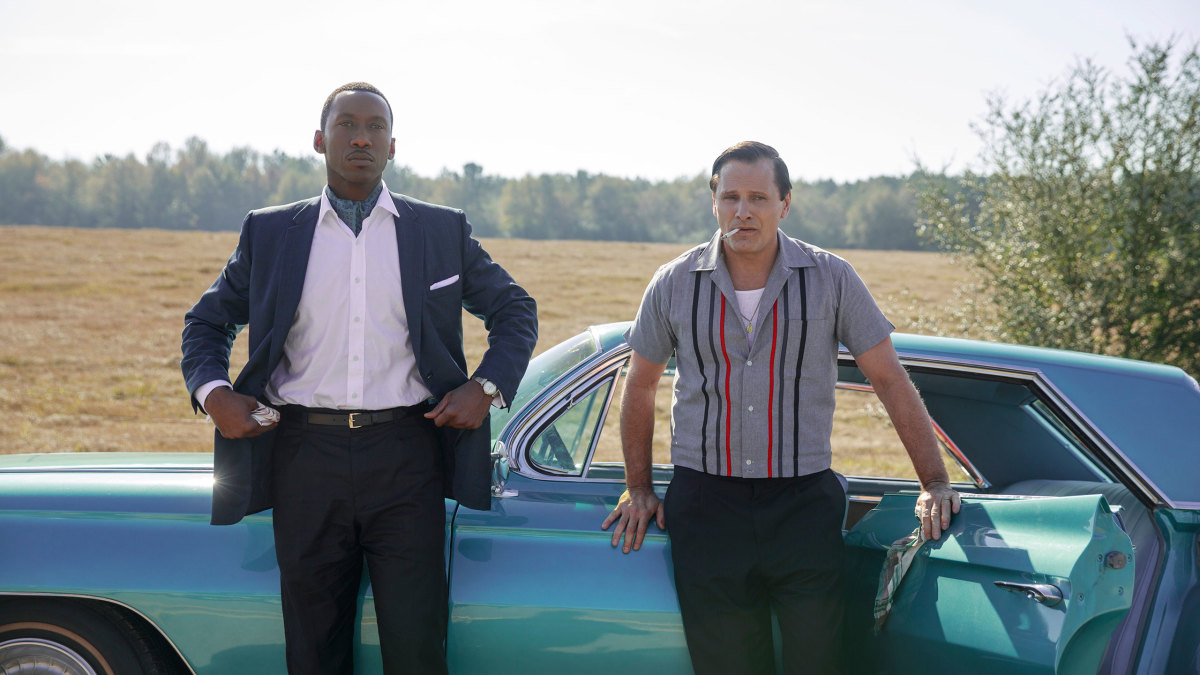
Mahershala Ali wins for playing Don Shirley, whose family reports they were left out of the filmmaking process (headed up by a white director and producer). Mexican director Alfonso Cuarón‘s Roma is the first Mexican submission to win Best Foreign Language Film, and Roma’s Yalitza Aparicio, who is of Mixtec and Trique descent, is the first Indigenous American woman to receive a nomination for Best Actress. Rami Said Malek becomes the first actor of Egyptian heritage to win an Oscar, for Bohemian Rhapsody.
All in all, it is the most racially inclusive group of winners in Academy history — people of color win solely or as part of a group for Best Supporting Actress, Best Supporting Actor, Best Actor, Best Director, Best Adapted Screenplay, Best Foreign Language Film, Best Documentary (Short Subject), Best Documentary (Feature), Best Animated Short Film, Best Cinematography and Best Costume Design.
2020 Oscars
The Academy Awards several steps back in terms of representation of people of color but also takes one step forward. All Best Picture nominees are white, except for Parasite — but Parasite wins! Taika Waititi, a self-identified “Polynesian Jew” with Māori ancestry, wins best Adapted Screenplay for JoJo Rabbit, and Parasite writers Bong Joon-ho and Han Jin-won win for Best Original Screenplay, with Bong Joon-ho also picking up a Best Director win. It is the first year South Korean films are nominated for Oscars (another is nominated in the Documentary category).
Also: Parasite becomes the sixth film with an Asian cast to be nominated for Best Picture but not pick up any acting nominations. One person of color — Cynthia Erivo for Harriet — is nominated for acting. Welsh actor Jonathan Pryce is nominated for playing an Argentinian character in The Two Popes, for which an actual Spanish speaker was hired to dub over Pryce’s Spanish lines.
2021 Oscars
Chinese Director Chloé Zhao is the first woman of color to win Best Director for Nomadland, which also won Best Picture. Steven Yeun and Youn Yuh-jung are the first Korean actors nominated for acting Oscars, for Minari, and Youn yuh-jung wins. Three Best Picture nominees are focused on characters of color.
Judas and the Black Messiah becomes the first film to have multiple black men nominated in the same category for the same film. Daniel Kaluuya is the first Black British actor to win an acting Oscar, Leslie Odom Jr is the first Black man nominated for songwriting and acting in the same year and Viola Davis is the first Black woman to receive two nominations for Best actress.
2022 Oscars
Will Smith wins Lead Actor for King Richard, which was also nominated for Best Picture. Ariana DeBose wins Best Supporting Actress for West Side Story, the same role that won Rita Moreno the Oscar in 1962. This makes DeBose the first openly queer woman of color to win an Oscar for Acting, the first Afro-Latina actress to win an Academy Award and the first Black queer actress to win an Oscar for Acting.
Drive my Car becomes the seventh film with a majority-Asian cast to be nominated for Best Picture but no acting awards. It wins for Best International Feature Film.
2023 Oscars
Michelle Yeoh wins Lead Actress and Ke Huy Quan wins Supporting Actor for Everything Everywhere All At Once, which also wins for Best Picture, Best Film Editing, Best Director, Best Original Screenplay. This is the first time a film with a majority-Asian cast has won Best Picture and three acting awards. It’s also the first time a movie with queer woman main character has won Best Picture. Stephanie Hsu is the first time a queer actor has been nominated for playing an explicitly queer character, although that depends on how you read Angelina Jolie’s character in Girl Interrupted.
Openly queer actor Brian Tyree Henry is nominated for Best Supporting Actor in the queer film Causeway.
Also, Ruth E. Carter became the first Black woman to win two Oscars, winning for Costume Design for Black Panther: Wakanda Forever.
Yeoh is the first Asian woman and the second woman of color to win Lead Actress in the Academy Awards entire 95-year history.
2024 Oscars
In the Best Actor category, gay Black actor Colman Domingo was nominated for Rustin and Black actor Jeffrey Wright for American Fiction, for which Sterling K. Brown also got a nod for his gay supporting role.
Lily Gladstone‘s Lead Actress nomination for Killers of the Flower Moon could have made her the first Indigenous person to win Best Actress in either the leading or supporting categories and the first out LGBTQ+ actor to win either lead acting category. But she did not win.
But we were gifted with Black actress Da’Vine Joy Randolph winning for her supporting role in The Holdovers, a category that also boasted Danielle Brooks in The Color Purple and America Ferrera in Barbie.
Poor Things and Oppenheimer basically swept the rest of the major categories.
2025 Oscars
It was another white year for the Academy. But we did get some notable acting nominations for Black Actors — Colman Domingo (Lead Actor, Sing Sing) and Cynthia Erivo (Lead Actress, Wicked) and Puerto Rican / Dominican actress Zoe Saldaña (Supporting Actress, Wicked).
Emilia Perez, a movie shot in Spanish and English and set in Mexico — but shot in France and written and directed by a French director with no knowledge of Spanish or English or Mexico — earned a stunning 13 nominations. Nickel Boys, a film with a mostly-Black cast based on Colson Whitehead’s novel, was nominated for Best Picture but overlooked for acting awards.



Thank you so much for this. A horrible history but a great article.
This is what makes Autostraddle so great. I love this journalism.
Quick correction re: Lawrence of Arabia. The white man who played Prince Faisal was Alec Guinness (of Obi-wan Kenobi fame, etc.), not Peter O’Toole, who played Lawrence (and is pictured in both of those pictures, looking very white, since both he and his character were British).
thanks, fixed!
Amazing work, thank you.
One detail missing in the 1987 nominations/winners.
Norma Aleandro was nominated for Best Supporting Actress for the film Gaby: A True Story. She plays Florencia Sánchez Morales, a Mexican woman that was the caretaker of Gabriela Brimmer. Aleandro is an Argentinean actress. That was a close call for Hollywood, at least she was born in Latin America.
Any chance of some live feed tonight? Because I really want to see some if Chris Rock is gonna burned the house down.
This was really informative, thank you! Laying it all out like you have (very straight-forward and readable!) really emphasizes how very, very problematic the Oscars’ lack of diversity is.
That picture of Laurence Olivier. Oh boy.
Don’t even get my started on Exodus:Gods and Kings, Gods of Eygpt and the Price of Persia resorting to similar Brownface tactics in this day and age because “People of color don’t sell movies”. But Joel Edgerton does? I’m glad they all bombed. They deserved those Ls.
I’ve seen the trailer of the Gods of Egypt FILM and it is horrible, horrible, horrible. It not only casts white actors for Egyptian Gods, it also applies a ridiculous Judeo Christian view of Good and Evil to an Egyptian Pantheon. Like, really? ANUBIS IS EVIL? How hard is it to do research about this subject? Jeez
Ridiculous Judeo Christian view of Good and Evil gets applied to ALL the pantheons, it’s one of the equality in stupid kinda things. They think our minds can’t handle any other view point than a Abrahamified Creator or Destroyer binary.
Yeah Hades is also always evil according to Hollywood isn’t he?
But yeah Anubis as evil oh let me guess because he’s the God of the Afterlife? pff.
Exactly.
The jackal head probably helps too though because we now seem to view carrion eaters as evil when they provide an important service.
In regards to Prince of Persia – plenty of Persians are fair-skinned.
That is true but they still went and browfaced the fair skinned actors. It’s like an extra layer of colourism deciding certain places are a “dark skinned people only place” but not hiring any dark skinned actors. Instead hiring some light skinned ones and sending them to the tanning salon or to make up because they still aren’t dark enough.
The stupid in such situations is like an onion; It has layers, is frustrating and may cause tears or a burning sensation.
I’m embarrassed to admit that I thought Laurence Olivier was black until I read this. I’ve never seen any of his movies and evidently only know him from photos where he’s in blackface…
Olivier is widely regarded as the greatest Shakespearean actor. And those traditionally play Othello in blackface.
Blackface is a racist tradition, ie, black and white minstrels, Othello, Dutch Christmas tradition Black Peter. All sorts of indignities are traditional, and tradition never excuses the inequality this action perpetuates.
I was told that people from Spain aren’t considered poc, as they are colonizers. And if you have colonized a country and from Europe then you can’t be a POC. So, I don’t think Pen lope Cruz counts. I come from Moors, so I’ve been kind of looking into this.
yes you are correct!
Yiz, they are white to us Piliponos as well as to their previous colonies, and children of Spanish and Pilipino parents are considered ‘mestizo’
This was a great read thank you.
That Middle Eastern article was interesting to read. I am familiar with half the people on that list. He wasn’t mentioned in that article(probably cause he is Iranian & Jewish), but I’ve meet Shaun Toub a few times. He played the middle eastern father in Crash(which won an Oscar). I have cousins who are distant relatives to him & they tease him a bit for playing stereotypical middle eastern roles(Iron Man comes to mind). But, on the plus side, I just noticed he played Pintar in the backwards episode of Seinfeld.
There could be a whole articles on the subtle micro-aggressions in hollywood films.
Wow, this is so thorough and informative! Since all I’ve been doing this week is grading students’ papers, I want to say that I’d give you an A+ and am literally emailing it to my professor now (we’re teaching a class that focuses on the production of stereotypes).
I took an African American Film Studies class in college and the professor actually decided that she wanted to be a film professor because of how much she hated Monster’s Ball.
This may sound totally stupid but I remembered, when I was a 13 year old girl, watching “Dragon: The Bruce Lee Story” and it was the first time in my life I realized the whitewashing side of Hollywood. Not with the movie itself, although it has a bunch of problems, but with one scene in particular: Bruce Lee (Jason Scott Lee), in a movie theater, watching Breakfast at Tiffany’s when the disgusting scenes of Mickey Rooney as the Japanese landlord are playing and how uncomfortable he looks with what he’s seeing.
So, Hollywood it’s not just entertainment, it can help you develop awareness/conscience, even in a 13 year old girl and with one really stupid movie.
I had the same experience with that same scene when I was about that age wow
Just a correction: John Coffey is the name of the character, not the actor. Michael Clarke Duncan portrayed him in the Green Mile.
Oh God. Affleck in Argo. I can’t believe that happened four years ago. It’s like straight out of a 40s flick. This is a good enlightening list. Still laughing over magic negro so much.
Just a quick correction though. In no. 10, it’s Pilipina (the Philippines’ official name is Pilipinas). That error doesn’t make this article any less awesome though.
Anyway, hoping to see a fairer Academy this year
fixed, thank you!
I’d forgotten that 2008 Supporting Actress race…who knew it’d be the precursor to the 2015 Best Actress Emmy race? It’s curious how many black actresses, post Oscar nominations, end up on television rather than in other high profile movie roles.
Thanks for putting this post together, Riese (and Riese’s girlfriend). It really helped add context to the longstanding #OscarsSoWhite problem.
They either end up in television, shitty indies or they rarely work. What’s Monique doing right now? Viola Davis is one of the best actresses of ANY ETHNICITY working today and even she is not getting the kind of movie offers she should be getting. Neither is Octavia Spencer. Jennifer Hudson is doing Broadway, which is a good fit for her, but she is not really getting many movie or tv offers either. Queen Latifah just had one of the best performances of the year in Bessie and I just saw a commercial today where she is playing some type of Mammy character in Christian film. Why? And Lupita is getting cast as talking animals and CGI characters. In big blockbusters admittedly but I think you know what I’m getting at. Meanwhile, I bet you my first born child that Brie Lawson and Alicia Vikander are about to be booked solid in lead roles for the next five years much like Jennifer Lawrence’s rise to the A List. My point is these women have all either won or been nominated for major acting awards and aren’t getting as many offers as their white counterparts who have been up for those same awards.
I’m not sure quite how to write this without possibly coming off as offensive but there’s something that really frustrated me about Asian representation (on top of the general lack of it).
As an East Asian, while I know that Indians are of course Asians as well, we just look so different and our cultures are so different that when someone put a South Asian on the screen to tick off the Asian quota, I just don’t feel represented.
That is not at all to say East Asian instead of South Asian, but can’t we have more of both instead of one or the other?
Apart from Master of None, I struggle to think of when I’ve seen both East and South Asians on screen together.
Harry and Kumar yo! Also the demon who appears in the first part of Constantine is Pilipina (she says “we will kill you” in perfect raspy Tagalog) but she’s casted as East Asian. Because you know, Asian. Lol
I understand where you’re coming from. I’m Southeast Asian (that part of our continent isn’t even mentioned at all in the stats) and that makes it even harder for me to find a representation in films, and I’m usually placed in the South Asian category.
Bottom line: just because it has an Asian in it, doesn’t mean it’s representing the entire continent. It’s a huge continent and yeah, we get it Hollywood, it’s very difficult to represent every damn ‘kind’ of ‘Asian’ in your film because there’s just too ‘many kinds’, but what we shouldn’t be lumped together.
This is a reflection of how badly Hollywood needs to diversify just about everything. Everything.
If those are the only instances we could think of… lol.
Here’s the thing, I’m actually an East Asian who was born and raised in a Southeast Asian country, LOL. So I feel you about Southeast Asian representation. People I see around me everyday in real life and it’s like Hollywood doesn’t know they exist XD
That frustrates me too!
I just started watching “Crazy Ex-Girlfriend” this week, and it has a Filipino guy with East Asian friends. I can’t say I recommend the show, but that’s one other instance… the only other one I can think of.
Oh yeah, I’ve seen that too.
BTW, do Ewoks count as Pilipino representation in American media? Because they spoke Tagalog.
Ok, that’s it, I’m done. Sam FUCKING Smith, from a James Bond movie, are you kidding me???!!!!!
I cried the entire Lady Gaga’s performance and I’m not even a fan.
I started crying before she even started singing for some reason, i was like, i am so here for this
In my head it was like and amazing and powerful breaking-of-the-dam combination: remembering the documentary + remembering the video for that song + that performance. I couldn’t hold back the tears.
She killed it
It wasn’t even a fitting song for a James Bond movie or listenable song on it’s own. My brain just tuned it out it was so dull.
So, a quick run down
Chris Rock monologue was, for my taste, a little too week: diversity in Hollywood is not only a black issue; it’s a black issue, a Latino issue, an Asians issue, a women’s issue. At this time the only diversity that Hollywood recognizes is whites with blonde hair and whites with dark hair.
Best Adapted Screenplay for The Big Short, a movie that all the time tries to make me feel the pain of a bunch of thieves that fucked the world (especially the role of Christian Bale). Nice move, Academy.
Best Original Song? I can’t even talk about this.
No more tears from DiCaprio? This subject is finally over, let’s give the floor to the next mediocre actor (for me he only deserves 2 nominations, and not even for best actor, for 2 movies he made in the early years of his career: This Boy’s Life and What’s Eating Gilbert Grape, that’s it).
Well, I think the Independent Spirit Award are more my thing.
I found Chris Rock’s joke on Carol appalling: “Of all the girl-on-girl movies I’ve seen this year, Carol was the third best”. Because, you know “lesbians, haha, porn for dudes”.
For me that was the final nail but it really started with his comments about Jada Pinkett-Smith.
I guess he’s not going to have any problems the next time Hollywood needs some window-dressing.
I found it appalling and at the same time expected it. I knew when Carol came out we were going to be subjected to tasteless jokes about lesbians during awards season. Other than. #oscarssowhite, this was another reason I had zero interest in sitting through them. I’m glad I used my time to watch 3 episodes of the Walking Dead instead.
Ugh that joke…everything revolves around straight guys’ dicks. When my colleague said this morning that he didn’t watch Carol because they are not hot enough for him, I wanted to punch him in the face.
You know Hollywood has a diversity issue when the two Best actress and supporting actress winners look like they came from the same womb.
Are you telling me that they’re not related? Nature is amazing, I thought they were sisters.
The Big Short is about guys who figured out that the system was built on greed-fueled stupidity and fraud.
ohhhhhhhhhhh I totally thought Ben Kingsley was white because of that one episode of Master of None, but no, no, it was about the accent and I just got confused, cool.
killin it with the longform, ‘s good.
Amazing research, so very informative. Thanks Riese
That photo of Laurence Olivier is absolutely absurd.
When you’re from Grece, are you regarded as a person “of color” in the US? Re: “Armenian actor Akim Tamiroff and Greek actress Katina Paxinou both get Supporting Actor/Actress nominations for playing Pablo and Pilar in For Whom The Bell Tolls.”
When you’re from Greece, are you regarded as a person “of color” in the US? Re: “Armenian actor Akim Tamiroff and Greek actress Katina Paxinou both get Supporting Actor/Actress nominations for playing Pablo and Pilar in For Whom The Bell Tolls.”
no you’re not considered a person of color if you’re from greece
i was pointing out that they are white and were nominated for awards for playing poc
OK, thanks!
But presumably being Spanish isn’t either? Or are the characters Spanish gitanos (Roma)?
Presumably the characters being Spanish isn’t either? Or are the characters Spanish gitanos (Roma)? Great article, thanks.
As someone previously noted, when you’re from Spain/of Spanish decent, you are considered white (as you should be, imo) since you are European and also the colonizer. I, too, was surprised to see Penelope Cruz and the like in the countdown as was intrigued by the “For Whom The Bell Tolls” entry and figured it was because of the Armenian actor. After some very light research, it doesn’t appear that Pilar and Pablo are gitanos but they could be, idk!
A friend of mine who is Chicana makes a difference between Latinx and Spaniards, as she calls them (people from Spain). I think her use of “spaniard” is self-explanatory.
(Sorry about the triple post!) Also, I remember watching “The Green Line” when it came out on TV and thinking “wow that film suuuucks! But for some reason, I’m confused because it feels like I’m supposed to think it’s great because of its production quality. Like I don’t have to like it but I should acknowledge it’s good.” Though at the time I couldn’t put my finger on it or phrase it. But naw, it’s downright mediocre.
Wow. Great Job Riese
I can see myself referring to this a lot.
Super proud of you, babe.
Hi Riese! Could you please please amend this to remove the Spanish actors and actresses? I love this otherwise and it is clear how much time went into this, but that completely ruins it for me. Spanish people are EUROPEAN. They are WHITE WHITE whiter than white. Like this is their queen and her daughters the princesses: http://i.dailymail.co.uk/i/pix/2014/10/12/1413122072879_wps_62_Spanish_Queen_Letizia_C_a.jpg
You know who also is Spanish? Martin Sheen (real name: Ramón Estévez). So c’mon! He’s not a PoC. Spain was the colonizer of Latin American indigenous people!
That picture reminds me of how Sofia Vergara is actually blond, but dyes her hair because “Latin is brown”.
Alfonso Cuarón should also not be on this list. He is White and Mexican. You didn’t include Charlize Theron for being African (thank God!), so it’s odd that you made that mistake with him.
Here this is Alfonso:
https://static-secure.guim.co.uk/sys-images/Guardian/Pix/pictures/2014/5/27/1401183824303/Director-Alfonso-Cuaron-a-011.jpg
cuarón is mexican, full stop. white-looking latinos are still latinos. he may have white passing privilege but he still has a racialized identity.
riese, i’d also add iñárritu to 2014 and 2015.
There’s no such thing as a Latino race. Just as there’s no such thing as a North American race. Latin America is comprised of all races, just like North America. After all, Latin refers to Spanish and Portuguese, Romance(Latin) languages. Of course, the way that Latin America became Latin, and got its white population, contains much worse aspects of racism than movie casting.
Latinx is not a race. He is white and Mexican. Mexican is a nationality not a race.
This is great–a really amazing piece of work, and I’m so grateful for the incredible amount of work that went into it. It really makes apparent so many appalling trends.
I especially appreciate your parsing some of the complexity around multiracial and white-passing actors, whose casting seems to be increasing. It’s wonderful if audiences of color can see themselves in such actors, and I definitely don’t blame them for advancing their careers however they can, but it doesn’t change the fact that Hollywood is perpetuating racist structures with that casting.
It also makes apparent how many of the better roles for actors of color come in deeply racist films (Monster’s Ball, The Help). So much work to be done…
The fact that you needed to write “OPENLY Asian-American Woman” in reference to Miyoshi Umeki is so damn sad.
I’ve never taken any interest in the Oscars myself, because every year it’s the same lack of diversity, the same ignorant discussions. You’ve always got those clueless people who say,
“Well, maybe no black actors in films this year were good enough…”
Okay, let’s assume that’s the case. Let’s forget about the pre-Oscars rumours that films like “Creed” and “Straight Outta Compton” were going to create some major awards waves, and say that every black actor in every Hollywood film this year turned in a forgettable performance.
The only reasons that that could possibly be the case is because of a) the tremendous *lack of opportunities* for black actors to play rich and nuanced roles, and b) the fact that the people who decide which performances are “good enough” are a bunch of old white dudes.
The only things stopping black actors (and really all POC) from winning awards have nothing to do with the actors and their abilities, and everything to do with the fact that we live in a racist-ass society where the system is rigged against them.
Oh, and I hate the old, “I can’t identify with a black/Asian/Middle Eastern/Latino/First Nation character” mentality. If you can identify with characters who are robots, vampires, aliens, fish, lions, cats, dogs, and dinosaurs, I think you can identify with a human being whose skin tone is a little different than yours.
To be fair, given that Othello’s dark complexion is a significant element of the story, non-black actors can only play him in blackface. So, should only black Shakespearean actors be allowed to play him?
If only black/African people played Othello, it would be more convincing as an entire context of a life lived within intersecting discrimination and injustices.
The issue is that of diversity of representation of humanity within film, and eroding the stranglehold of power that the Academy Awards voting group has in determining which stories are told, by whom, and their access. It is a tangent that you are adressing, whereas I am in interested in the main issue.
yes, only black shakesperean actors should play othello, unless major changes are made to the production
Hello,
I apologise for my english, I don’t speak English very well. But Fernanda Montenegro can’t be considered “Latina”, she is white. To put her in this list to explain how racist Hollywood is, is totally wrong. In Brazil we only see people like her on the television on cinema etc… Only people with european heritage like Fernanda. If Fernanda Montenegro can be a example for discrimination from latinas in Hollywood, then we must believe Gisele Bündchen has a very hard life as a “latina” in the High Fashion World…
this is such good work, riese, thanks for the toil & trouble! i’ll add – (& i say this as an outsider) we especially need a greater range of latinx voices in the industry, like afrolatinx representation.
I know I am late to the party on this but this is AMAZING!! I have never read anything quite so detailed – this is fascinating. I am a disabled actor, and through work with Equity have been involved in lots of stuff on diversity and this is one of the most in depth things I have read. Will definitely be sharing!
So Hollywood is just like our history books…white, white, and more white.
In 1999 Brazilian actress Fernanda Montenegro was nominated for an Oscar in the Best Actress category. She is the only Brazilian yet nominated for the Academy Award for Best Actress and the only one nominated for a role in the Portuguese language
she was included when i originally wrote this post in 2016, but if you look upthread, another commenter told me to remove her?
this is amazing work!
Thank you for the extensive work. Related question, in your research, did you see how many West Asian/North Africans were nominated for playing a character from the Indian subcontinent, or vice versa? Or a L Word type situation(ie west or central Asian playing Latinx & vice versa)? Cause I’ve seen this happen more than a few times, just don’t remember if anyone was ever nominated.
i looked for any actors of color including west asian/north african/middle eastern actors that were nominated for anything so if anybody was they would’ve been included — i should add though that Rami Malek is Egyptian and Freddie Mercury was Parsi, which I think falls into what you are talking about with the Indian subcontinent?
That would. If I remember correctly Parsi people are Indians who can trace their roots back to the Persian & Zorastarian.
I noticed when this article first came out I commented about the movie Crash, which has a few POC starting in the movie, including Terrence Howard, Ludacris, & a couple of Iranian actors & actresses won best picture that year. However, I think only the white people, ie. Sandra Bullock was nominated for acting in that movie. I can’t remember if Terrence Howard was nominated or not. Would that film be also on this list or since it’s a wide cast of people it doesn’t fit?
Terrence Howard was nominated for Hustle + Flow that year! Everybody is included in the numbers represented in the infographics, not every individual nomination is mentioned in the timeline unless it was notable for a specific reason. Matt Dillon was the only actor nominated for Crash. :-/
Oof, Matt being nominated is just as bad. But, thank you for your reply.
I’m about to go off a little….sorry for the long post in advance.
Riese…99% of the films you’ve mentioned that have POC leads or POC casts were in films that I call “persecution porn”. There are very few of these films that my POC friends or family have watched more than once because they’re tired of seeing POCs beaten or mistreated or always having to overcome oppression (with the help of a white saviour). Over the last 10 years or so, I’ve not seen a single frame of the POC films mentioned except Moonlight because I don’t want to see myself or other POCs portrayed as people who have to be beaten down for an hour or more for simply existing. Even with Moonlight, I was a little put off by yet another story about a black kid growing up in a household with an abusive addict. In my 32 years of life, I’ve never met another POC who grew up that way (trust me when I say I grew up poor too) so why is that all that’s portrayed? I know some of those films are headed by POCs but 9.9 times out of 10 those are the only films that will get greenlit. So Hollywood feels like if they are giving us a bone by greenlighting the persecution porn then will complain when POCs don’t go see it by saying the reason why POC films aren’t made is that they don’t make money. No, Karen and John, they don’t make money because that’s not our lives anymore. Black and Latin women are the most educated demographics in the U.S., how about we build a film around them without making them caricatures (I’m looking at you, Tyler Perry)? Trust me there are some Madeas in my family but why is that always on my tv or in theaters? There are hardcore racists in a lot of white people’s families (even the rich ones) that you almost never see in film, so why is that paraded around? Oh because there must be tap dancing negroes or slaves or Latin/black prisoners/felons or victims of Jim Crow or addicts or immigrant housekeepers in order to continue to make non-POCs feel comfortable about their station in life.
Sorry…I’m just so frustrated by film in general. TV could do better too (and it has gotten better) but it’s still has some growth. That said, TV is FAR better with representation than film.
Btw…I love “The Color Purple” with a passion of a 1,000 suns. I’ve seen it probably over a thousand times. Growing up I never related to a character more than I did Celie. No white savior either, Celie saved herself.
Sorry…I wrote all of that on my phone and upon rereading it isn’t as coherent or on topic as I’d like. My bad.
Oh do go off!
Linked in the post under the subheader Black Actor is the NYT article “What Does The Academy Value in a Black Performance?” by Brandon K. Thorp and it tepidly sorta discusses the persecution porn issue but it lacks a perspective that feels relevant.
If you got the energy you should try to hammer this comment into an essay format and submit it the Fire In the Belly issue or something.
REALLY.
no need to apologize for going off! you’re right!
and i agree with Lex.
I’ve almost completely given up on watching Hollywood films, and as this makes clear the Oscars rarely give anything to movies that aren’t in English. Still, it was very interesting (and depressing – so much exploitative garbage even when the actors are the right ethnicity!) to read. Thanks for putting this together!
Is it odd to wonder where the white/Middle Eastern line gets drawn through West Asia? Based on the Akim Tamiroff/Shohreh Aghdashloo difference it looks like it’s the border between Armenia and Iran? I’m in Canada and when I’ve seen discussions about diversity in Canadian film, Armenian-Canadians actors like Arsinée Khanjian are usually called West Asian rather than white. But I know the lines can be different in the US – and obviously any line is going to be a bit arbitrary (I’m Azeri by heritage and it seems like we’re white when people are making one political point and middle eastern when it’s a different one).
Armenia, Azerbaijan and Georgia are in the Caucasus region and they are not included in most maps of the Middle East.
I realise that (although frankly when maps show the greater middle east they actually do include the South Caucasus countries), but you do realise that while the history of the region means that the ethnic areas overlap, right?
The whole idea of “the middle east” as a ethnic or racial label is an artificial one arbitrarily defined by which power ruled which part post-WWI? I see plenty of maps that include Turkey in both Europe and the Middle East, so how does that work?
Because wherever the modern borders lie, the ethnic populations cross them (and until some of the ethnic cleansings that happened over the past 100 years, did so even more obviously than they do now). So if your dividing line is for nations that were part of the USSR, what does that mean for (for example) the ethnic Armenians or Azeris who are from Iran or Iraq (or the Levant or Egypt)?
I know that none of this is the focus of this article, and I’m not trying to distract from the main point about the shit levels of representation at the Oscars (because yes, that deserves the attention!) but let’s not pretend that “most maps” are some kind of neutral marker and not an arbitrary holdover of imperialism.
You’re right. What I meant was I understand where Riese was coming from when she didn’t include Armenia, Azerbaijan and Georgia in the Middle East map. Yes, there are many Armenian, Azeri, and Georgian people living in the Middle East. But this is a part of a larger debate. Caucasus countries are not politically tied to the Middle East (except Azerbaijan.It does have strong ties with Turkey, but also with Russia)
I also understand where you’re coming from. I’m from Turkey and if you ask me, there are more similarities than differences between Azerbaijan and Turkey.
Thank you both for this question and discussion. I’m half-Armenian and I find this topic very interesting. A historical tidbit that relates to all this: In the 1900s and 1920s in the US, a few court cases ruled in favor of granting Armenians access to naturalization/legal status as “white.” Even though many Armenians still face racism, having access to many of the same rights as white people since then has had a big impact on the opportunities that many Armenians have had access to. I’m guessing that this has influenced how people in the US view Armenians, even if they don’t all know the legal history. I don’t know as much about whether people from other Caucasus countries gained access to “whiteness” at that time or about whether Armenia being a predominantly Christian country had an impact on how this played out, and I’m new to learning a lot of this history, so I apologize if I’ve mistaken any details here. I just find it all fascinating!
Your tidbit is very interesting. I read about another case from 1909, the first case to classify Middle Easterners as Caucasian. Syrian-Lebanese defendant won his case by arguing; “If I am Mongolian, then so was Jesus, because we came from the same land.”
I’ve been following the discussion on whether or not to add a MENA category into the Census.It’s really interesting to see the stark difference between older and younger generation. Older generation just want to check the “white” box and move on, but the younger generation want to recognize their identity and community.
Just reread my previous comment and realized I should clarify:
– I said “Armenians” a few time when I meant “Armenian-Americans/Armenians in the US.” I’m sorry for this error.
– When I say I find this “fascinating,” I mean “convoluted and messed up, and helpful to be learning more about to better articulate some of how racial categories and racist systems operate.”
This is such great research. And thank you for including info not only about what actors were nominated for/received awards but also about the types of stories that get awarded.
Genuine question, is Hailee Steinfeld considered a person of color?
there may not be a yes/no answer to this q for all circumstances. You can see some of what she has said here: https://filipinotimes.net/entertainment/2019/09/24/hollywood-star-hailee-steinfeld-proud-filipino-roots/. from my own experience with white skin & white privilege & both white & brown ancestors that i don’t neatly fit the white|poc binary. in some circumstances the responsible choice is to ID as white & show up as a responsible white person. in other circumstances i need to speak up & share what i have been given by my brown ancestors. it’s a balance.
that said i don’t ‘claim POC’ and would be v disappointed if Hailee were to, but i haven’t seen her do so. personally i found it helpful she is included in this list.
also adding while we’re here that i see she her great-grandmother Evelyn Olivia Bain is African-American. https://answersafrica.com/hailee-steinfeld-dating-boyfriend.html
i can relate to having to walk a tightrope w not giving white ppl a chance to use my ancestors of color for diversity points and not erasing them either.
The Ten Commandments did not win Best Picture. It lost to Around the World In 80 Days.
Since this was just updated, what geographical limits are you using here for your Middle Eastern category?
You have Riz Ahmed in the Middle Eastern section instead of the Asian section, and call an Armenian white and a Persian Middle Eastern, but Pakistan is in South Asia, and Armenia and Iran share a border (and overlap historically). I know US-Americans like to imagine that Muslim-majority countries are somehow lean middle eastern even when they’re in South or Central Asia (or even squarely in Europe), but isn’t that a wildly problematic thing to be promoting?
One thing you might want to look at as an update for the timeline is that after Sacheen Littlefeather’s death, Navajo author Jacqueline Keeler published a piece of investigative journalism alleging that she was not Native American and did not have a family connection to the tribes she claimed.
“Openly queer actor Brian Tyree Henry” ??? this is news to me, can someone show me where he is being openly queer?
I tried looking it up and could not find anything definitive other than those weird bot Celebrity dating sites who post the exact same article word for word. And those sites I wouldn’t use as a source. They claim he’s engaged to a man named David Eigenberg but there is no other source for where that info is coming from. Not a common name so I tried searching it and pulled one man, also an actor, and he’s been married to the same woman for nearly 20 years. I’m not saying Brian’s not one of us. I’m just not seeing an accurate source for it through Google.
Did you know that Lupita Nyong’o is Mexican?
So *technically* there has been 1 Latin winner for Lead Actress, not zero.
Correction: She won for supporting actress.